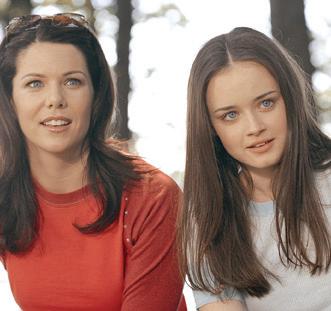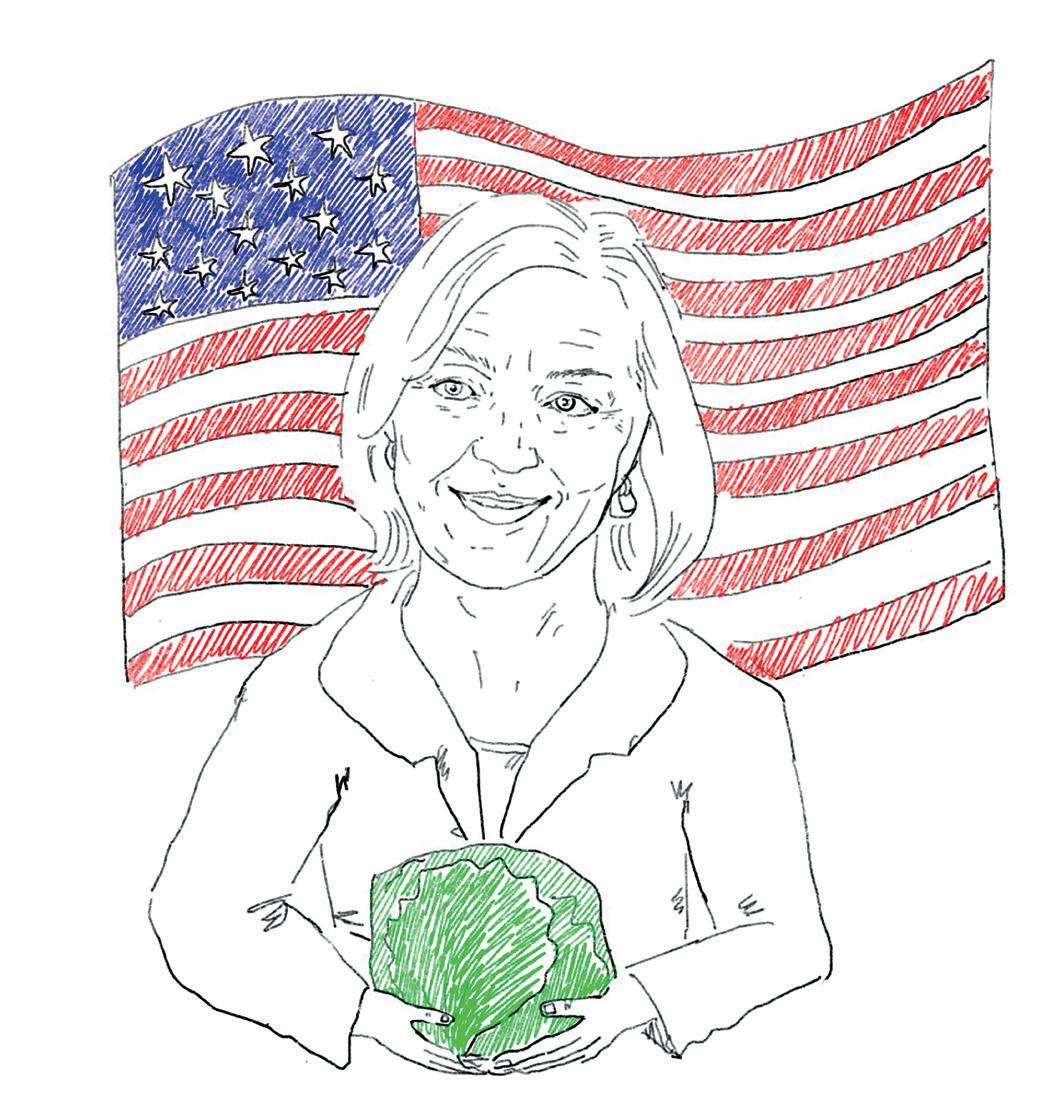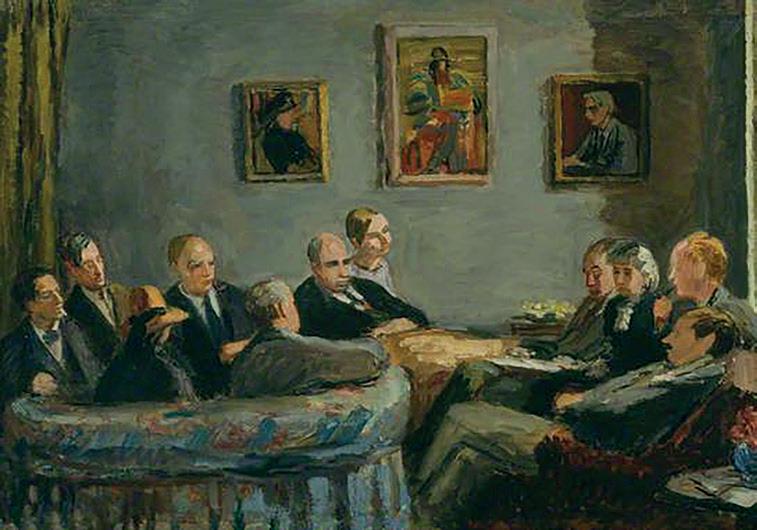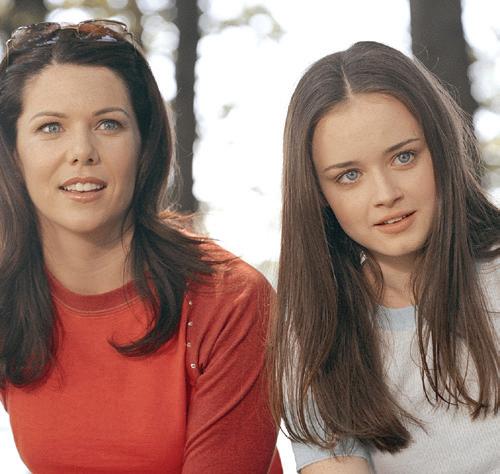

“Why
us?”: Students react to tuition fees scam
5

The role of fashion in politics: Trump and Harris
Page 9



“Why
us?”: Students react to tuition fees scam
5

The role of fashion in politics: Trump and Harris
Page 9

Gracie Moore and Charlie Gershinson Editor-in-Chief and Deputy Editor
ACHANGE to the food outlets available on Streatham Campus has been met with mixed reviews by students.
Over the summer, there have been some alterations to the food offerings available to students in Devonshire House.
The £2 meal outlet, called the ‘Super Savour Kitchen’ has changed locations from DH2 to The Terrace. Its previous location

Hezbollah’s technology concealed with explosives Page 24
is now occupied by an Asian-themed stall called ‘Sushi Boba Poké’. The Super Savour Kitchen, which originated as a result of a student-led campaign has increased in price with the lowest price for a meal now £2.25, 25p more than previously. Other options advertised include an omelette and topper for £3.15 and a jacket and topper for £3.60.
The movement and rebranding of the £2 meal stall comes after previous criticism that it was moving away from its original purpose to combat the cost-of-living crisis for students. Last year, Exeposé reported that some students, including some of the student activists responsible for the crea-
tion of the Super Savour Kitchen in the first place, had felt that the scheme had become commercialised due to the added costs of extra items such as garlic bread.
Meanwhile, Sushi Boba Poke is significantly more expensive. Using an app, the lowest-priced items are edamame beans and forgotten ends, each for £2.50. The prices increase steeply from there. Six pieces of salmon nigiri cost £7 for example while the tuna dragon roll option costs £9.50. Also on offer are poke bowls, such as the £11.60 tuna poke and boba drinks each for £5.
According to an survey that Exeposé conducted, only 68 per cent of responses
stated that they were aware of the Super Savour and Sushi Boba outlets available on campus. Also, 82.5 per cent of students were aware that the £2.25 pricing of the Super Savour meal used to be £2, a 12.5 per cent increase in price from last year. On the price increase, one student said they were “very disappointed in the Super Savour Kitchen. The jacket potato with cheese and beans (no salad) used to cost me £2.99. This year they are charging £4.58 for the exact same thing. Very disappointing and will make it more difficult as a disabled student to find affordable hot meals on campus.”
Continued on page 4
Amy Rushton and Agata Koralewska Editor-in-Chief and Deputy Editor
IT has recently been reported by The Times that the government plans to increase tuition fees in line with inflation and restore maintenance grants for the poorest students, in an effort to revitalise the university system.
Tuition fees for English universities are suggested to be raised to £10,500 in the span of five years, as 40 per cent of universities are expected to return a budget deficit this year.
English universities have experi-
enced financial struggles and expressed a need for more help in order to accommodate students from more varied backgrounds. The Vice-Chancellor of Newcastle University, who chairs the Russell Group of universities, has stated that unless there is an increased in funding, no improvements in teaching quality and resources available to students will be seen.
Education Secretary, Bridget Phillipson, warned that the value of existing tuition fees, which have been frozen since 2017 has been “eroded” due to failing to rise in line with inflation.
Maintenance grants, which were worth up to £3500 and were abolished by the
Conservative government in 2016, are intended to shield poorer students from an increase in fees, though concerns over whether this will be enough or alternatively risks disincentivising poorer students from attending university.
Labour have not confirmed these plans and are not expected to make a statement on tuition fees until the spending review next April, but, in an interview with LBC, Phillipson has expressed concern for the health and longevity of the university sector, stating “The system we have got overall is the worst of all worlds.”
Many have expressed concern over a potential increase in tuiti-
on fees; Alex Stanley, Vice President Higher Education as the National Union of Students (NUS) stated on behalf of NUS, UK “Students must not be expected to foot the bill for the university funding crisis. Increasing tuition fees would only up the debt burden on students, especially those from the poorest backgrounds, and further punish students who are investing in their futures and the future of the country.
“Our institutions clearly need more money, but so too do students. The failure of maintenance funding to keep up with inflation has left the aver-
Continued on page 4
Editors
Print: Gracie Moore and Amy Rushton
Online: Callum Martin and Katie Matthews
Print Deputies: Charlie Gershinson, Rosie PetersMcDonald, Agata Koralewska
Online Deputies: Emily Roughton and Amberly Wright editors@exepose.com
News Editors
Print: Gracie Moore, Amy Rushton, Charlie Gershinson, Rosie Peters-Mcdonald and Agata Koralewska
Online: Shagnick Bhattacharya news@exepose.com
Features Editors
Print: Eleanor Rogers
Online: Michelle Chung features@exepose.com
International Editors Print: Henry Anderson Online: Magdalena Kanecka and Annabel Jeffery
Comment Editors Print: Tom Richardson Online: Sophie Zoltowski comment@exepose.com Satire Editor Print: Rosie Peters-McDonald Online Caspian Davies
Lifestyle Editors Print: Anna Spencer Online: Amberly Wright lifestyle@exepose.com
Arts + Lit Editors
Print: Judy Dodd and Kayleigh Swart
Online: Emily Sara Rizzo artsandlit@exepose.com
Music Editors
Print: Harry Morrison and Brooke Taylor
Online Zandie Howells music@exepose.com
Screen Editors
Print: Pollyanna Roberts and Charlie McCormack Online Bronwyn Payne and Dumebi Jibunoh screen@exepose.com
Tech Editor Print: Charlie Gershinson Online: Daniel Grayshon
Science Editors
Print: Agata Koralewska
Online Callum Martin and Katie Matthews sciandtech@exepose.com
Sport Editors
Print: Eloise Grainger and Ben Scott Online: Callum Martin and Katie Matthews




@exepose
@exepose facebook.com/exepose issuu.com/exeposeexeter
HI everone and welcome to our second issue of the new academic year. I hope you all had an amazing Welcome Week and the more academic side of uni hasn't been too stressful so far. Exeposé have also been busy and we've got a wide selection of articles for you this week. As always, Exeposé is at its best when it can highlight as many voices across the university as possible. If there's an important issue at the university or in Exeter you've think we've missed please email us at editors@ exepose.com. Exeposé is run by students and for students and we want to hear about the issues that matter to you.
This issue, News covers the Uni's new AI policy (Page 3), the Debating Society's talk with Lottie Moss (Page 6) and more.
In Features this week (Page 9), Agata looks at the role of fashion in politics and Arts and Lit discuss theatre on a student budget (Page 19) and Lucy gives us the run-down on the Booker Prize 2024 (Page 18). Tech explores the use of concelled explosives in Israel's attack on Hezbollah (Page 24) and discusses Mr Beast's legal troubles (Page 25). Exetera Exetera… explores self-blame in mental health (Page 26) and delves into the archives of tuition fee protests in the 90s. Also in this edition, Sport writers debate the 3pm blackout rule (Page 30) and cover Anthony Joshua's recent defeat in heavy-weight boxing (Page 32).
We have really loved meeting you all the last few weeks and hope you continue writing for us throughout the year. If you have any questions about joining the paper, please check out our socials @exepose. We hope you enjoy reading this issue and a huge thank you to all our contributers and proofers!
Gracie and Amy






Namibian students object to ban on political activism
ANATIONAL housing shortage in the Netherlands has led to an increase in reports of landlords harassing and illegally evicting tenants. Students, especially from abroad, are said to be particularly vulnerable due to a perceived lack of knowledge of the Dutch legal system. After having his apartment’s locks changed, Hesham Ab delrahim, an Egyp tian student, had to sleep on the street until he won a lawsuit against his landlord. Several drivers are behind the current crisis. In addition to the short age of properties driving demand, regulatory changes have imposed rent limits, and new fees are squeezing landlords’ profits. Many landlords are therefore keen to sell their properties to avoid operating losses, and unoccupied properties can fetch as much as several dozen percentage points more than occupied ones on the market, creating an incentive for them to remove tenants as quickly as possible.

NAMIBIAN students have objected to the University of Namibia’s (Unam) ban on political activism, which has been in effect since April. The Namibia National Students Organisation (Nanso) criticised the decision, arguing that it infringes on students’ rights. Nanso president Dorthea Nangolo emphasized that Unam, as an institution offering political science, should encourage political engagement rather than restrict it. She added that banning political societies on campus limits young people’s exposure to politics and hampers their ability to participate in the country’s democratic process. The ban has sparked wider concerns about academic freedom and expression at the university. Political analyst Ndumba Kamwanyah criticized the University of Namibia’s ban on political activism, arguing that universities are inherently political institutions. He highlighted that Unam’s foundation was deeply influenced by politics, especially during Namibia’s struggle for independence. He emphasised that universities should be spaces for debate, political experimentation, and engagement with societal issues.
CONCORDIA University in Montreal, Quebec have decided to waive tuition fees for Indigenous students across the province. This decision follows on from a report by the Truth and Reconciliation Commission of Canada titled ‘Calls to Action’, which called on the government to ‘provide adequate funding to end the backlog of First Nations students seeking a post-secondary education.’ Manon Tremblay, the director for Indigenous Directions at Concordia University, believes that this policy is a ‘game changer’ and will vastly improve accessibility to higher education for Indigenous communities. Concordia are taking other steps to increase accessibility for In digenous students, such as introducing bridging programs to help students who don’t go through CEGEP (publicly funded secondary school) and revamping their student centre to include Indigenous artwork, making their university community more inclusive.


Labour peer suggests raising UK tuition fees
ETER Mandelson, a Labour Party peer, has called for domestic undergraduate fees to be raised. Writing for The Guardian he claimed that "England’s universities have reached an inflection point."

Mandelson said current fees should rise from £9,250 to £9,481 in line with inflation, capped at 2.5 per cent annually. This would net the University if Exeter, who had 22,856 undergraduates in academic year 2023/24, around £5 million, accounting for international undergraduates who pay different fees. Mandelson said linking fees to inflation would steady university finances while ensuring fees don’t become more expensive in real terms for students. He said that the loan repayment scheme should also change. Rather than a flat 9 per cent of income rate, it should rise in £10,000 salary increments starting at 3 per cent. beginning at the current £25,000 threshold. Mandelson argued that universities should make ‘more tough choices’ to improve efficiency, comparing British universities student to teacher ratios to European universities.
Charlie Gershinson Deputy Editor
HE University of Exeter has changed its academic misconduct policy to allow the use of generative AI (GenAI) for some modules and coursework.
Debuting at the start of the 2024/25 academic year, all modules taught by the University are now categorised as ‘AIprohibited’, ‘AI-supported’ or ‘AI-integrated’. AI-prohibited modules continue to ban the use of all AI tools while the other two categories allow these tools to at least some extent. AIintegrated modules are those where use of GenAI tools is part of the Intended Learning Outcomes of the modules or the assessment brief,” according to the University of Exeter Library. For coursework within AI-integrated modules, students must note which GenAI tools and prompts they used as an appendix, similar to references at the end of a typical piece of coursework.
AI-supported modules allow the “ethical and responsible use” of GenAI tools for coursework. This includes the ability for students to use AI to “summarise literature, improve the structure of your work or quality of English language.” Coursework in these modules require an acknowledgement through a submission sheet at the start of any piece of coursework (pictured on the right). This submission acts as a record of AI-generated material used for the corresponding coursework which could be defended, if necessary, in a viva to prove that AI was used solely to support their work and that the end product is still original.
These rules apply to any form of AI being used including programs which aid with spelling and punctuation, such as Grammarly. Other applications of GenAI which can be used in AI-supported and AI-integrated modules according to the Study Zone include: use as a management tool, planning, information gathering, reading, note making and writing and analysing data.

Any form of AI being used including programs which aid with spelling and punctuation
In a survey conducted by Exeposé , students expressed different opinions about the changes to the academic policy.
One students described it as “necessary”, saying that they “quite like the new ruling that it is allowed, given that it’s used responsibly. It’s a fair policy”.
Another thought that “we should use and rely more on [AI] as the world is growing with it.”
However, other students had more negative views. One believed that “all AI should be banned in education. For centuries, people have been getting through university education without the use of machines. The use of AI will destroy our intellect and give people unfair advantages in their work in terms of time taken.”
Another specifically criticised the inclusion of AI programs to aid with spelling, punctuation and grammar, saying that “citing Grammarly and Microsoft Editor seems a bit unnecessary. I’m not going to bother telling them if I use
AI to come up with ideas.”
Students also noted that they had used AI for academic coursework in the past before it had been permitted by the University. These uses include “help with summarising texts and providing summaries” and “help with understanding complex readings and finding better ways to express my thoughts when they were muddled.”
In a survey taken by Exeposé last year, students discussed further how AI had helped them with their coursework previously.
One student with an Independent Learning Plan (ILP) said that there should be a clear difference between using AI to write essays and using it to help in the process of writing them. They used “AI almost every time [they] write an essay especially during the editing phase” such as helping with spelling and punctuation. They summarised that they did the research and came up with the ideas themselves but found that AI helped them to communicate in a well-written way.
Another student spoke of how AI could be used as a “summary tool for big pieces of work, or to make a piece of writing
more formal.” This was further expanded upon by a student who used GenAI tools to “provide [them] with context to write [their essays] (like literature reviews).” The same student said they also used AI “for more mundane tasks like writing cover letters and supporting statements for jobs.” Commenting more generally on the rise of AI tools, one student said that its use in academia is “an unavoidable consequence of its unchecked and scarily rapidly development. As much as I am opposed to it, the prospect of making essay-writing easier using AI will… always be an attractive proposition.”

“An unavoidable consequence of [AI’s] unchecked and scarily rapid development”
When asked for comment, a spokesperson from the University said, "From this academic year, all assessment briefs will include a statement about the ways in which students are permitted to use GenAI in that assessment. Assessments will either be AIintegrated, where use of GenAI
tools is part of the Intended Learning Outcomes of the modules or the assessment brief; AI-supported, where ethical and responsible use of GenAI tools in the development of an assessment is supported; or AI-prohibited, where the use of GenAI tools is prohibited as their use prevents achievement of the module learning outcomes. All assessments that come under the category of AI-supported and AI-integrated will be required to include a student declaration acknowledging their use of GenAI in their assessment.
“This new policy is in response to requests for greater clarity from students and staff about how (and how not) to use AI in assessment. The university acknowledges that using AI transparently, purposefully and in appropriate ways is an important work-readiness skill. The new policy and guidance is intended to inform and support students in the different ways in which AI should (and shouldn't) be used in their varied assessments. A full guide on this and how students should cite the use of AI can be found here: https://libguides.exeter. ac.uk/referencing/generativeai.”

Chevelier Inn has recently removed a framed portrait of author J.K. Rowling. Rowling’s series of Harry Potter books represent a worldwide phenomenon and a portrait of her in the Exeter Wetherspoons recognised her time at the University of Exeter where she studied in the 1980s.
After regulars at the Chavalier
noted an empty spot where the missing portrait previously stood, Wetherspoons has responded and confirmed the portrait was taken down after being defaced recently. Many have speculated the vandalism occurred in response to controversy over Rowling’s vocalism on transgender people and alignment with the “gender-critical” movement.
Since 2020, Rowling has publicly spoken about her views on transgender people, for example recently accusing transgender Paralympian athlete Valentina Petrillo of being a “cheat”.
J.K. Rowling’s online comments have made her a centre of controversy online, making the removal of the portrait in Wetherspoons even more noticeable. Since the removal of the portrait, Eddie Gershon, a Wetherspoons spokesperson has responded, saying “Wetherspoon will replace [the portrait] with the same or a similar picture of JK Rowling as soon as possible.” This raises questions on how a second portrait will fare against Exeter pub goers.

“It’s the most ‘exetahh’ thing they could have done!”
Continued from the front page
ON the location of the food outlets on campus, 35.1 per cent of students were not aware that the Super Savour outlet had moved to the Terrace and that the Sushi Boba Poke bar now occupies the old space in DH2. When questioned on their thoughts on the Super Savour price change, over 28 per cent of students rated their happiness with the change at one out of 10. In fact, only 13.3 per cent of people rated it at six out of 10 or above. One student said it was “beyond the price range of most students” and that the University “should work to add more budget friendly options (e.g. a bagel place)."
Sushi Boba Poke is not as popular among students and many students are questioning the need
Continued from the front page
STANLEY went on to say,
“our institutions clearly need more money, but so too do students. The failure of maintenance funding to keep up with inflation has left the average student in England with just 50p to live on per week after rent and bills. The crisis impacting university finances is the same that is driving students into poverty in increasing numbers.
“So let’s be clear: increases to university funding must be done hand in hand with increases to student maintenance funding. Rather than turning to the easy option of increasing fees, the sector and government must find a sustainable solution,
to add this new food outlet. One student said in our investigation that “the University is taking advantage of their largely affluent student population without taking others into account.” Another student said “it is very niche and specific only to people who like sushi.” Finally, a student stated that “it’s the most exetahh thing they could have done!”
This brings into question the range of food on campus, where nearly 72 per cent of students stated that they didn’t think there was enough variety, adding comments such as “need more gluten free” and “need more budget friendly options.”
In a post from the Guild officers Instagram account, they said that “this year, one of our priorities is to encourage the
university to improve its food offering, from both an affordability and dietary requirement angle."
A spokesperson for the Students' Guild said, “The Guild and Officers have championed and supported students to ensure there are low-cost food options on campus with the £2 meal campaign. Officers worked with the University to secure the longterm future of the Dish of the Day, and this year are continuing to ensure you have affordable food options that meet your needs.
“Whilst we are pleased to see the Super Savour Kitchen moving to the Terrace which provides more space for students to enjoy a more affordable option on campus, we continue to advocate for food on our campuses which offer value for everyone.”

“University should be way cheaper”
starting by balancing public and private investment in higher education — currently just 16 per cent of funding per student comes from the public sector.”
In June, UCU General Secretary Jo Grady said "The higher education funding model is broken beyond repair. This is not a crisis that can be dealt with on the cheap. We need to sweep away tuition fees, as Keir Starmer pledged to do, and replace them with sustained, longterm public funding. Anything less would be a continuation of sticking plaster politics.
"Similarly, our colleges will only thrive and deliver the skills we need if staff are paid fairly, closing the gap with
schoolteachers. The crises in education, health, and welfare can all be solved by taxing wealth and big business. That's how Britain's public infrastructure can be repaired: failing to do so would be a political choice, and a historic mistake."
Exeposé surveyed Exeter students for their reaction to the suggested rise in tuition fees.
Of the respondents, 78.6 per cent stated they felt “negative” about the planned increase to tuition, with 14.3 per cent expressing a “positive” reaction and 7.1 per cent expressing no opinion. Many of the students surveyed argued a rise in fees in accordance to inflation would benefit university students, with
one stating “Tuition fees should go up so universities have money to provide a better experience”. When asked whether a tuition fee increase would have presented a financial barrier to them going to university, had the increase occurred before their first year, 50 per cent said no, with 32.1. per cent saying yes and 17.9 per cent unsure. This translated into 64.3 per cent per cent of respondents stating they would still have gone to university, 32.1 per cent remaining unsure and only 3.6 per cent stating they definitely would not have gone to university. One respondent stated that so long as loans rose by an equivalent amount it “doesn’t actually create a barrier, with fees acting as a
the consequences of the floods.
Agata Koralewska Deputy Editor
NEAR the end of September, The Met Office issued a floods warning issued due to severe weather conditions and heavy rain shower. A yellow warning was announced by the Met Office as parts of Devon filled up with more and more water. Although the warning has now been lifted, many places are still affected by
Exeter was not amongst the most affected areas; however, many could be impacted by trains cancellations and other disruptions experienced when travelling to the city. The Great Western Railway has stated that two trains were stuck between Exeter and Plymouth, and the lines between Exeter St David’s and Penzance were completely shut down.
Drivers have been advised to not try to travel through
the waters in order to ensure their safety, and citizens were encouraged to refer to official government guidance on what to do when there is a flood warning.
Some of the advice that the government wesbite offers include checking flood warnings frequently or putting flood protection equipment in place.
Overall, the short term results of the flooding have been eradicated but the power that water holds should not be ignored.
tax rather than a real loan”. With another respondent stating that “life through the duration of study would not change” but “it will increase the end number of student debt”. Others expressed criticisms of current tuition fees, stating “University should be way cheaper” and “I begrudge the £9k as most of what I do is just reading PDFs.”
A spokesperson for the University of Exeter said "We are aware of the recent reports relating to discussions of potential changes to tuition fees. We will work with colleagues, and partners in the sector, to consider any specific proposals when appropriate.”

Gracie Moore and Rosie Peters-McDonald Editor-in-Chief and Deputy Editor
ON the 10th September, the government released a statement warning students against ‘student smishing scams’, which allegedly targets students around the time they receive their first maintenance payments. Cyber criminals have been impersonating the Student Loans Company via telephone calls (vishing), emails (phishing) and text messages (smishing) asking students to click on a link to change their bank details. Scammers typically target student loans at the beginning of the year when students are expecting their first payment into their accounts. According to the government, they paid £2 billion to students over the autumn term last year and it stopped £2.9 million of maintenance loan payments being taken by smishing and phishing scams, where students received and acted on false communications.
‘Smishing’ is defined is as fraud involving text messages and is currently the most popular form of scam, with students being asked to click a link to complete a task, for example: providing bank details or confirming personal information. This gives the scammer the chance to have the money diverted to their bank account.
Exeposé spoke to students about the scam. One student showed us a message sent to him which read, "STUDENT FINANCE: Please make sure that we have the correct information for your initial loan by heading to" followed by an unofficial web address claiming to be part of SFE (Student Finance England). Exeposé spoke to a number of people on the issue, all of whom agreed that the scam sounded like something they might confuse for a legitimate message due to its wording and timing, having been sent just days before SFE payments were due to be paid into students’ accounts. When asked what they thought of the fact that they were being targeted, multiple students described the ‘smishing’ attempt as "scummy behaviour" with
one asking, ‘why us?’ Another anonymous student suggested that these scams looked a lot like ones targeting the elderly, saying, "it’s more like something my grandfather would click on." Another suggested that students or young adults might be particularly vulnerable to scams such as these given their lack of experience as financially-apt adults, saying, "it’s the same thingwitholdpeople,itworksthesameway."

The SLC (Student Loans Company) have stated that they will never ask you to provide or verify your personal or financial information via text message. On the issue of scamming, Alan Balanowski, Risk Director at SLC is urging students to pay close attention to any communication they receive from SLC, or indeed, scammers pretending to be SLC. He said:
“Starting or returning to university is an exciting time, but it’s also busy, with students getting organised and setup for the academic year, which includes dealing with information from different organisations, including ourselves. We aim to ensure our payment process is simple for students, but we do experience a rise in smishing scams at this time of year.”
“We have a range of preventative methods we use to target scams, but
the most impactful tool we have is working together with students to stop scammers. If a student receives a suspicious message, they should delete it and report it immediately.”
“Our message to students is quite simple: think before you click.”
A Guild spokesperson stated "We’re aware that at this time of year scammers target student loans and we’ve got some guidance on our website

Amy Rushton Editor-in-Chief
TO mark the 70th anniversary of the publication of Lord of the Flies notebooks and correspondence belonging to William Golding will form a new exhibition on display in Exeter.
Drafts, letters with Golding’s editor and correspondence relating to his other works will be on display in the Bill Douglas Cinema Museum until the 15th December.
Golding was born in Newquay, Cornwall and wrote his bestselling novel Lord of the Flies whilst working as a teacher in Salisbury. Initially facing numerous rejections,
Lord of the Flies was eventually published in 1954 and saw overnight success; Professor Tim Kendall states “within a decade it was established as a modern classic.”
Whilst the University of Exeter holds Golding’s original manuscript, which was written in a school exercise book, on loan from the Golding family — this is too fragile to be on display to the wider public.
Speaking to the BBC, Caroline Walter, interim head of heritage collections at the University of Exeter, stated “This is an exciting opportunity to unite archival material from two distinct collections in Exeter, allowing visitors to delve into the rich literary heritage of the South West and illuminating
Golding's creative journey."
Golding's daughter Judy Carver also welcomed the exhibition as an oppurtunity to introduce the materials to a wider audience, telling the BBC "The Golding family are grateful to the University of Exeter for their care of the manuscripts and typescripts on loan to the university". In addition to the exhibit, the University are running a series of free but ticketed events to celebrate Golding’s heritage, including a talk at the RAMM on Neanderthal — Homo sapiens encounters in Golding’s The Inheritors; a talk on the archives of South West authors organised by Special Collections and a film screening of Lord of the Flies at Exeter Pheonix.
Editor-in-Chief
THE University Challenge team from Exeter are through to the next round of the competition after defeating their opponents, Reading, in the first round. Monday night’s programme, aired on BBC2, saw Exeter storm straight out of the blocks with a comortable gap of 95-0 after the ‘Starter for ten’ questions. This Exeter team are the 20th to compete for the University and got off to a great start. However, Reading began to
pull the gap back and closed it to 105-75 at the halfway mark. The pressure was on at this point and in the end, Exeter managed to seal the deal, winning 240-100 and securing their place in the second round.
The Ram Bar in the Forum, on Exeter’s Streatham campus, streamed the show as students and staff piled in to watch it.
Lucy Carr BA (Hons) Art History & Visual Culture is one of the contestants in the Exeter team and said, “They played it on all the screens so we could hear it, and it was slightly surreal to see yourself on television,”
“Everyone was extremely supportive,
cheering when we got the questions, which was a nice atmosphere.”
Exeter’s contestants, Reading, finished as runners-up in 2022 so their defeat to Exeter was well received in the Ram Bar.
The team was put together by the Students’ Guild earlier this year following a strict recruitment process. After this, they were required to audition for the show and were subsequently selected to be part of the 28 university and college teams to be featured in the television rounds.
The programme is available to watch on BBC iPlayer.

“A million celebrities and none of them have their sh*t together”:
speaks
Amy Rushton Editor-in-Chief
ON the 18th September, the Debating Society welcomed model Lottie Moss to discuss her experiences of fame, the influence of her sister's model Kate Moss shadow, complications with Ozempic and giving back to society. In a talk chaired by Matthew Watkins, Moss began by sharing her early experiences in the modelling industry. Having been scouted at her sister’s wedding in 2011, Moss was only 16 when she made her modelling debut an experience which has shaped an uneasy relationship with the industry ever since. At first the industry was “glamourous”; Moss jokes about the disconnect between shooting with famous models to appearing at school the next day but she quickly learnt how to navigate it; “How late to stay at parties and who to speak to in order to do well”. Moss speaks openly about the danger fame can have, explaining “I’ve seen what fame has done to my sister and what it’s done to so many people… attending industry parties at the age of 15 and 16, I was introduced to alcohol and drugs at a very young age and it impacted my life heavily” Moss has spoken openly in the past about her experiences with addiction and rehab, often stemming from issues within the industry itself and its disregard for individuals; “It’s people around you using you to get certain places in their life, there’s so many pressures in this industry. It never feels like enough and you’re always just craving more and more and more... once they’ve got their
money their job is done, they don’t care about the mental health side or what is going on behind the scenes”. She suggests she was never alone in struggling in this sense, claiming “I go to a million events with a million celebrities and none of them have their sh*t together.”
Modelling has changed drastically since Moss started; the money no longer lies solely in big campaigns but in social media with funds being funnelled into channels such as TikTok. The ‘social media effect’ has reshaped the industry with a survey conducted by technology platform
Launchmetrics estimated that a single post from influencer and model Gigi Hadid is worth $1.2 million, meaning more traditional campaigns are slowly becoming defunct.
Moss herself broke from the traditional modelling industry, announcing in 2021 her decision to join Only Fans. This has changed the trajectory of her career, with Moss stating “I got shunned after doing OnlyFans” and critiquing the hypocrisy of the industry, particularly the double standards imposed on men and women doing sex work.
Using Pamela Anderson’s career as an example, Moss derides the more ambivalent attitude directed at Tommy Lee; “[he] was her partner and no one batted an eyelid at a rockstar with his thing out, but she was shunned for it.”
This hypocrisy reared its head later in the talk when Watkins invited audience questions, with one audience member expressing concern for “lonely men exploited by OnlyFans models.”
Moss’s own agent argued this attitude only pushed the blame onto women who were not forcing men to pay but simply proving a service the

porn industry was always going to prevail but at OnlyFans put economic power back into the hands of women.
The ensuing debate, summed up by Moss suggesting “They can always go outside and meet people" hammered her point home; that women’s empowerment frequently comes at the cost of derision.
This double standard was a recurring topic across the talk, with Moss pointing to the toxicity of the media.
Only days before her talk at Exeter, Moss was captured by tabloids leaving a club. The same papers which had reported on her time in rehab and struggle with fame, now gleefully mocked her appearance once again.
This emphasis on appearance, particularly on weight, has long plagued the modelling industry. Moss’
half-sister, Kate Moss, is renowned for popularising the ‘heroin-chic’ fashion trend which prioritised thinness above else, and it’s a pressure Lottie Moss too has experienced, stating “I felt such pressure in my industry to fit in, it felt like so many jobs weren’t an option if I wasn’t stick thin.” It’s this attitude which has pushed so many celebrities towards experimental drugs such as Ozempic, she states “All these celebrities are one Ozempic, let’s be so real- lana del ray... It peaked when Kim Kardashian came out in that Met Gala dress, the only way she could have that dramatic weight loss was taking Ozempic.” Moss too has experienced the after-effects of that pressure; her use of Ozempic escalated to the point where she was “taking an amount meant for somebody over 100 kilos” and was ultimately
rushed to hospital after overdosing. Coming away from the experience, Moss states “everybody’s obsessed with staying thin and staying on trend and staying relevant… just be you and say what you want to say.” She emphasises her desire to elevate the voices of women in the industry, explaining “I may not have gone to Exeter University or anything like that but I have a voice and I definitely want to change the way people see women.” Her new goal is to “give back as much as [she] can” whilst encouraging others to stay authentic to themselves. It’s an emphasis which is summarised in the last audience question directed at moss, enquiring whether she’d had a ‘brat summer’, to which Moss replied: "Some people aren't brat and that's fine."
Climate change inspired mural unveiled in Exeter: “we still have a chance”
ACLIMATE conscious mural was unveiled on the 28th September at New Buildings, close to the city library, as a part of the FUTURES festival of discovery and in partnership with Green Futures at the University of Exeter.
The mural depicts a young girl, smiling whilst holding a butterfly, gazing out onto the vibrant city of Exeter, powered by green technologies. Behind her, a black and white depiction of pollution and carbon emissions represents the past, while the mural’s text reminds us: “We still have a chance.”
This climate-inspired street art was created by Exmouth artist Gary ‘GARf’ Cook as a visual representation of a positive and sustainable fu-
ture for the city. Stuart Crewes, Creative Director of Artwork Exeter praised the installation, saying, “The representation of city landmarks of the present shows a place that is futurefacing, positive and dare I say hopeful.”
By brightening up a forgotten corner of the city, the mural aims to foster a sense pride among Exeter residents, acting as a motivator to protect the local environment. There is hope that the mural will spark positive conversations around climate change and inspire the public to make climate-conscious choices, leading to a brighter future for the local community. Cook stated, “good street art should lift the soul, better still if it promotes discussion, debate and even a change in beliefs and behaviours,” reinforcing the purpose behind the new mural’s presence in Exeter.



ASOMBER figure, Huw Edwards appeared in Westminster Magistrates’ Court on the 16th September. A horde of cameras flashing, journalists looking on, and a public let down by the presenter they trusted. The face of the BBC: the figure relied on to inform us of the Queen’s death and election coverage, now a figure to be wiped off journalistic history, a shadow hanging above his head.

A figure to be wiped off journalistic history
The scandal emerged in July 2023 with rumours of misconduct published in The Sun
These allegations suggested a BBC presenter had received sexually explicit images. In a statement from his wife, Edwards was named as the subject of allegations. At this stage, concerns were raised over the legitimacy of this report and the reputation of The Sun called into question. What seemed like a defamation of Edwards however, quickly turned into a well-founded case exposing Edwards’s abhorrent behaviour.
As the case has progressed, it has become clear that Edwards received images from now convicted paedophile, Alex Williams, including 41 indecent images. In consequence, the case has been directed to court.
Notably, the case took place in a Magistrates Court, rather than the Crown Court which
generally deals with more serious cases. As an ‘either way offence’, the case could be heard in either court. This sets our expectations for both the estimated severity of the case, and the sentencing likely to be given. While abhorrent, Edwards’s crimes are reduced in their severity given that the images were not shared, therefore reducing impact in the eyes of the law. To be clear, Edwards’s actions do perpetuate a cycle of exploitation, abuse, and paedophilia and therefore should warrant serious consequences. In court, Edwards was held publicly accountable. Edwards was given a six-month sentence, suspended for two years (dependent on reoffence) and is now on the Sex Offender Register. How did this sentencing come about? The sentencing is the product of a constellation of factors: considering the likelihood of Edwards being a future threat, the impact of said crimes, along with the associated mental health risks. When coming to a sentencing, the holistic approach is evident in the number of mitigating factors considered, and specialists consulted. The mitigating factors are referenced in the Sentence Remarks. First acknowledged is Edwards’s previous good character, the ‘lack of previous convictions’ are noted. This reduces the likelihood of reoffence. Providing context to Edwards’ actions, Forensic psychosexual therapist Dr. Appleyard, notes that the use of social media developed as a way to ‘manage his low mood’ and ‘fragile self esteem’. Additionally, noting a
Irisk of suicide due to the deterioration in family relationships and media scrutiny. While challenging to speculate, it can be assumed this risk would increase with imprisonment. Along with Edwards’s apparent acceptance of guilt, remorse, and anticipated rehabilitation, this leads to an overall lower sentence than might be expected.

The BBC’s reputation is tainted by an abuse of power
H ow does Edwards’s conviction impact the BBC? Once more, the BBC’s reputation is tainted by an abuse of power. Standing alongside figures like Jimmy Savile, and clouded figures like Russell Brand, there is now a shadow over Edwards, and by extension the work of the BBC. While Edwards crimes were not committed in the workplace, there have since been suggestions of Edwards’s behaviour being inappropriate and making other members of staff uncomfotable. This indicates cultural reform is necessary: higher standards of conduct, accountability, and disciplinary action where necessary. The case is saddening to hear, and devastating for all those affected by Edwards’ actions. Going forward, the BBC holds a responsibility to safeguard all staff, especially younger members, mitigating the risk of abuses of power from those most influential.

N the Presidential Election debate, Donald Trump claimed that Haitian immigrants had been capturing and eating pets and dogs in Springfield, Ohio. The accusation spread on social media following a police report that a woman had lost her cat, believing it was stolen by Haitian immigrants. The claim, however, has been debunked by the city’s police department, officials and Ohio’s Republican Governor, Mike De Wine. This incident seems unlikely to have affected Trump’s chances of re-election, although senior Republicans are worried. It is speculated he heard of it through either his Vice Presidential candidate, J.D. Vance, who grew up near Springfield and had also publicly made the claim, or Laura Loomer. Loomer is a social media personality, known for making often baseless claims and has been see accompanying Trump as he campaigns around the country. The BBC reported that leading Republicans and sources close to Trump were worried of the effect Loomer was having. Marjorie Taylor Greene has called Laura’s comments “appalling” and that they did “not represent who we are as Republicans or MAGA.” Despite this, Trump has played down allegations of control — describing Loomer as a “free spirit”. So, why was this claim made and repeated? Why do many people continue to believe it? At their core, conspiracy theories stem from uncertainty and disaffection. They come when people are unsure of
the truth and have received what they see as unsatisfactory answers. Many people who get caught up in them have also suffered some kind of personal grief or des peration and are for what ever reason unable to accept the provided answer. Some may have had bad ex periences with government, leading to a high level of distrust in the authorities and so no longer believe what they are told. Others may simply desire to be ‘awake’ and know ‘what is really going on’. An article in the psychological research journal, Current Directions in Psy chological Science, said “conspiracy theories appear to provide broad, internally consistent explanations that allow people to preserve
beliefs in the face of uncertainty and contradiction.”

It is important to note that sometimes these theories do become true. Watergate is a clear example. And other times, information comes to light that gives credence to conspiracy theories.
The idea of 9/11 being an ‘inside job’ is abhorrent and ridiculous, until one learns that in 1962, the US Department of Defence proposed a set of false flag attacks to J.F.K. under the umbrella of Operation Northwood to goad Cuba into a war. These would involve attacks on the US military, Cuban immigrants, US citizens and UK Caribbean Commonwealth citizens. The plans were outright rejected by J.F.K. Of course, one cannot conclude that because the above is true, then the conspiracy the-
ory must also be true. That is a fallacy. But take the information into account and one begins to understand why some people may be more inclined to believe such theories.

Of course, one cannot conclude that because the above is true, then the conspiracy theory must also be true
Social media plays a key role. It provides the forum for the discussion of these theories, as well as the sharing of the supposed evidence which proves them. Disaffected, angry and confused people can take refuge there, and in its echo chambers they are introduced to new explanations, their views then reinforced over and over again, to the point where they then begin to introduce others to the same ideas. People are able to speak as they wish on social media, providing an unrestricted forum for sharing ideas. Some platforms are known to restrict what is said, which can also be seen as an issue. Conspiracy theories have and will continue to be a major part of society. At their root, they stem from uncertainty and disaffection, fuelled by convenient yet insufficient evidence and the ever-growing presence of social media.
Agata Koralewska, Deputy Editor, analyses how clothing choices of the presidential candidates play a vital role in political representation
THERE are various factors that contribute to a successful political image and one of them is the choice of clothing. The colours that one dresses in or ones footwear may not seem like a very significant detail, however, it can be a real game changer when it comes to impressions of the public. Politicians are often reduced to the symbols that they represent, for that reason many search for ways to distinguish themselves from the crowd of other candidates. Raging from the well-known ‘Make America Great Again’ cap to the vibrant red tie to the general style of the garments, in politics nothing goes unnoticed.

Politicians are often reduced to the symbols they represent
As the US election will take place in November, the two most popular candidates for the presidential race, Harris and Trump, both demonstrate an understanding of fashion’s role in politics so far. Starting with Trump and his famous MAGA cap, his strategy was to use the baseball cap’s functionality and message of ‘fitting with the crowds’ and turn it to his advantage. His idea behind it is to prove that he is no different from his fellow citizens and project an image of a normal ‘American Dude’ rather than a powerful billionaire. His fashion choices have always been consistent. He has worn the same red tie since the late 1970s in order

to give the impression of a professional, influential figure. In order to show willingness to fight for the presidential seat together, both J.D. Vance (the Vice-President candidate) and Donald Trump wear the same red tie to show off their solidarity and elegance.
Kamala Harris, the current Vice President and ex-top prosecutor, has implemented some similar strategies in choosing what to wear. In terms of how our society is structured, women are the ones expected to be experimental in fashion, and dressing simple but smart is associated more with masculinity. Because of this, she chose to dress in a more masculine style in order to present herself as a worthy opponent to Trump. Her fitted suits and a confident walking style have helped her to establish herself as a leader and further increase her popularity. She has also been spotted wearing converse which further emphasizes her will to show herself as an approachable person who can understand common people’s struggles. Although there is a visible difference between Harris’ and Trump’s clothing, one fashion choice is shared between the two candidates. The US flag pin badge has become a symbol of patriotism and American unity. They both wear it proudly on their chest to convey a promise of sacrificing themselves to the nation. The real impact of how the candidates have presented themselves will be seen after the election results are announced.
LIVERPOOL’S Exhibition Centre recently welcomed Prime Minister Keir Starmer back for the Annual Labour Party Conference, which lasted between the 22nd to the 25th September and held over 17,000 attendees.
The key policy promises, as per Labour’s manifesto pledges as well as Keir Starmer’s speeches to the nation since being elected, promise to cut winter fuel payments, continue to call for a ceasefire in Gaza, a two-state solution between Israel and Palestine, and support the release of Middle Eastern hostages — or “sausages” as Starmer mistakenly said during his speech at the Conference. The Labour Party leader further condemned the violence on the Israel-Lebanon border, calling for an immediate “de-escalation”.

Labour Party Leader condemned the violence on the Israel-Lebanon border
Starmer’s Labour has shown support for creative subjects studied in schools, which the Conservative Party attempted to reverse with their mandatory mathematics A-Level in January 2023. Starmer further pointed out that there are “trade-offs” necessary to sacrifice before implementing change within our country. It is a shame that the timeline for reaching these thresholds was not specified for the Labour Party delegates attending the conference. Furthermore, Deputy Prime Minister Angela Rayner hinted at a significant social housebuilding project to launch shortly, but Starmer did not elaborate on this further during his main speech on Wednesday. Specific social housing targets are yet to
be announced by ministers or the Prime Minister himself. The expectation stated by Rayner is that next month, Chancellor Rachel Reeves will make a detailed promise about the cost and number of social housing units being built around the country’s most deprived areas. However, all that is left for the time being, is speculation regarding the policies to come for the most deprived members of the general public.
Issues such as the absence of council tax discounts for those who live alone are still of high concern to the British public. Starmer’s slip-of-the-tongue mistake of calling Gazan and Israeli hostages “sausages” also didn’t help to make the conference look entirely professional, especially with thousands of people in the audience. Starmer vows to build “a new Britain”, with his crucial slogan during the recent general election pushing for “change” within the nation. Yet, there is still a question of whether his promises have gone far enough despite the party’s successes since being elected — such as scrapping the Rwanda deportation plan in Starmer’s first few days of being in power.
By the last day of the Conference, the day after Starmer’s speech, the atmosphere appeared to have died down completely, with some delegates leaving immediately after the speech finished the previous day. With the Prime Minister heading off to New York for the annual UN General Assembly meeting, the reason why his speech was delivered on Wednesday instead of Thursday as the last day of the Conference, made many people question the priorities of our Prime Minister. There have been many promises made by his Party during the election and following their results — but how soon will Starmer and his party deliver these?

EDITOR: Henry Anderson
Gracie Moore, Editor-in-Chief, reflects on her year abroad in Madrid
BEFORE arriving in Madrid, I was told that the year abroad would be the best year of my life. That it would be a year of partying, siesta-taking, and living my Carrie Bradshaw-esque lifestyle. As much as my year in Madrid was the best year of my life, it was also far from the romanticised ideal that I had fixed in my head. During the year, I taught English in a montessori academy to Spanish children between the ages of three and nine. I knew before I left that I was going to experience a huge culture shock — something that, at first, would feel like a mountain to overcome — and I wasn’t prepared enough for the differences in education between the UK and Spain.

MY YEAR IN MADRID WAS THE BEST YEAR OF MY LIFE
Teaching play-based learning classes was unlike anything I had ever done before and sometimes the children behaved so badly that I would dread going to work. The job itself took a lot of getting used to for this reason but by December I was fully in the swing of all the travelling and hard work it took. However, alongside this, I was also trying to complete the legal procedures in order to avoid deportation. This required endless paperwork and appointments at police stations on the other side of the city which were stressful to manage, especially given how slow bureaucratic procedures are in Spain. My advice on this would be to make sure you have all the documents you need to gain citizenship before you fly out, so you’re not rushing around when you arrive.
In my free time, I explored the museums, bars and parks of the city with my friends from work as well as I spent time with my housemate who is from Venezuela. I was very lucky to be able to live with her as she introduced me to lots of her Hispanic friends and could show me her favourite Venezuelan restaurants and bars. Because of this, we are now the closest of friends and I have met so many more interesting people through her, as well as been to countless exciting corners of the city. Retiro Park has also become my favourite place in the world and I’m so excited to go again soon! Dealing with culture shock is a necessary evil and it can be extremely difficult. My best advice would be to follow the four steps of cultural integration as they come. The first is rejection and this can feel disheartening, but it shows that you are adjusting to a new culture which is fun. For example, I experienced some embarrassment at the start of the year because I was out of touch with the Spanish custom of kissing people on the cheeks. It was a weird custom for me to have to get used to but being kind and patient with yourself is the most important thing during this stage. The second stage is simplification whereby many people choose to simplify some customs or behaviours they observe in order to make them feel more at home. Third, is adaptation.

DEALING WITH CULTURE SHOCK IS A NECESSARY EVIL
Eventually, you won’t need to simplify another culture and you will find that your life naturally revolves around that culture. Finally, integration! By the end of your time abroad, you truly won’t want to leave and you will feel like you belong. It’s also important to remember that these stages pass in a nonlinear way and progression is not a straight line graph.

Overall, my advice is to get stuck in. Know your boundaries and how far you’re willing to go but if there is even a small part of you that wants to do something (such as going to an event, going on a date or trying a new activity), you should grab the bull by the horns and absolutely do it. Don’t give yourself a reason to ask “what if?”, even if you are anxious. Let life happen to you when you are out there, and you will be grateful you loosened your grip on the things that don’t matter.
Charlie Gershinshon, Deputy Editor, explains the ongoing situation in Bangladesh
THE nation of Bangladesh has seen significant political turmoil in recent months as a series of deadly protests led to the resignation of long-serving prime minister Sheikh Hasina.
The unrest began in mid-June with the reinstatement of quotas for civil servants. Abolished in 2018, these quotas reserved 30 per cent of all civil service positions for descendants of Bangladesh’s war of independence but had been put back in place in a High Court decision earlier this year. This led to protests by the ‘Students Against Discrimination’ movement which saw the quota system as unfair and biased towards the children of political elites who are likely supporters of the ruling Awami League.
killings since the party took power in 2009.
Among those responsible is prime minis-

THERE HAVE BEEN 600 CASES OF ENFORCED DISAPPARANCES
ter Sheikh Hasina. Hasina first became prime minister in 1996 as a beacon of democracy. She had started her political life as a student activist and joined other pro-democracy groups to oppose the dictatorship of General Hussain Muhammed Ershad. Her first government was praised for a water-sharing deal with India and

The protests were initially peaceful but had descended into violence by mid-July after inflammatory statements made by political leaders which evoked the 1971 war of independence. 150 were killed in the month of July as well as a further 100 killed on the 4th August. While the reinstatement of quotas became the catalyst for the youthful revolution, there have been several long-term factors bubbling under the surface.
One reason is an ongoing cost-of-living crisis which has particularly affected young adults. According to a 2023 report, the youth unemployment rate was 12.3 per cent, over triple that of other age cohorts, amounting to an overall unemployment level of nearly 32 million in a country of 170 million. Inflation also remains a consistent 10 per cent.
Another factor, perhaps more significant, is the restriction of free speech and civil liberties in Bangladesh in recent years. The Awami League has undermined the independent judiciary and curtailed freedom of expression through repressive laws. Rights groups have alleged that there have been 600 cases of enforced disappearances and hundreds more extra-judicial
a peace deal relating to tribal insurgents in the south-east. Upon her return as the country’s head of government she has led a positive economic picture, making Bangladesh one of the fastest-growing economies in the region with a record of ambitious infrastructure projects. However, her authoritarian leadership style has now caught up with her. On the 5th August, Hasina was ousted as prime minister after weeks of violence. Tens of thousands took to the streets and marched towards the capital Dhaka to demand her dismissal. Her resignation was likely hastened by the influence of the army. Now, a caretaker government is in place led by Nobel Peace laureate Muhammad Yunus with two student leaders in high positions within the government. The students are hoping to prolong their political influence by founding a new political party to upset the current duopoly between the Awami League and the Bangladesh Nationalist Party (BNP). The two existing parties have been pushing for speedy elections but that has been rebutted by the interim government.

Tom Richardson
The Labour Party Conference, which took place two weeks ago, failed to take away from the ongoing headlines and controversies which are defining the Prime Minister’s leadership. Keir Starmer, who has held office since July, faced strong approval ratings early on, being able to focus the narrative on his manifesto. However after a honeymoon period as brief as Liz Truss’s premiership, the Party is facing the problems of division and scandal which plagued the Conservatives after 14 years of rule.
Party divisions first became apparent ever since July when the SNP motioned to scrap the two child benefit cap. Seven MPs openly defied the government and in turn were kicked from the parliamentary party, with around 40 other MPs also abstaining.
The Conference has taken place only weeks after the controversial decision by the Government scrapped the Winter Fuel Payments. Around 50 MPs openly defied the government in not voting for the cut, furthering the narrative of divisions
in the Party. However, the bigger problem for the government with the cuts is not party division, but that the payment cuts are almost universally unpopular amongst the electorate. Even for those who agree with cutting universally applied benefits to reduce public spending, the idea of removing the payments for pensioners on the bread line seemed a step too far.

The Conservatives are for once on the attack, having been able to use the policy to their advantage. Sunak has been able to largely unify the party against Labour, win over pensioners with messaging about choosing between food and warmth, and highlight divisions in the Labour Party with their large abstentions and rebellions.
During the Conference, the main issue in contention was not the Party business, or even Winter Fuel cuts, but the ongoing
scandals surrounding Lord Ali — affectionately known as ‘donorgate’, It first started when eyebrows were raised when Lord Alli, a top Labour donor and personal donor to Keir Starmer, was given unrestricted access to Downing Street after the election.
Ever since then the issue has been in the headlines, awkwardly for Labour — even through the conference. When the government was attempting to shift the narrative towards plans for growth, more revelations about gifts received by cabinet ministers came to light.
When you think things couldn’t get worse, they have. The Party is also now under scrutiny for taking more than one million pounds in gifts and donations from the betting industry.

The Party is now under scrutiny for taking more than one million pounds in gifts
Rosie Duffield, a prominent MP who is known for her controversial

views on transgender rights, left the party last week criticising Starmer for his “cruel and unnecessary policies” and the “sleeze and nepotism” under his tenure.
For the electorate, this all shows that it’s business as usual in government. Same old divisions, scandals and policy failings as before.
Approval ratings for the government have went from record highs after the election, to record lows. As a result of this Starmer’s authority over the party
has weakened, with those in the Labour Party who are against Keir Starmer, such as Diane Abbott now have the ability to openly criticise the government without facing punishment
Whilst the honeymoon of mass popularity may be over for the government, they have over four years to deliver on their promises, unify as a party, and rebuild trust with the electorate, something which the previous government was largely unsuccesful in doing.
ADOCUMENTARY released by the BBC in September
brought to light several serious allegations against Mohamed Al-Fayed, the owner of Harrods between 1985 and 2010, in an attempt to uncover previously hidden truths of his sexual misconduct. Mohamed Al-Fayed was the father of Dodi Fayed, who was in a relationship with Princess Diana up until her death.
Al-Fayed has been accused of sexually abusing female staff at the department store in the documentary titled Al Fayed: Predator at Harrods
The documentary suggested that the company failed to prevent or investigate — and in fact aided in hiding — these events. This news comes after the BBC themselves have received severe criticism for continuing to pay Huw Edwards — who recently plead guilty to three
charges of making indecent images of children — his full salary for five months after his arrest. With so much in the media about sexual abuse (particularly of women and children), it’s difficult to believe that organisations are willing to hold those (namely men) committing horrific sexual crimes to account.

In light of the BBC’s revelations surrounding Al-Fayed’s behaviour, lawyers of the women who have come forward with accusations against Al -Fayed are calling for the company — which is now owned by the state of Qatar — to release figures on the number of people silenced by non-disclosure agreements. One huge question in this investigation is as to who aided in covering up and silencing victims of Al -Fayed’s abuse. The lawyers representing
Al Fayed’s victims have stated that they “expected that anywhere Mohamed AlFayed went, abuse would follow’, whilst also implying the existence of ‘credible evidence at other… properties and businesses, including Fulham Football Club,” another of Al-Fayed’s businesses.

This means that it’s likely more accusations are to come, and that the covering-up and silencing of Al-Fayed’s many victims took place across multiple businesses — it was not exclusive to Harrods. While the Metropolitan Police have confirmed that they are addressing the situation and looking to arrest those who either aided or took part in the abuse, it’s too little too late for survivors of Al-Fayed’s abuse, who should have been protected as and when these crimes took place.

It’s too little too late for survivors of AlFayed’s abuse
Harrods’s current managing director, Michael Ward, has stated that the company “failed [their] colleagues and for that [they] are deeply sorry,” whilst also admitting to the fact that “rumours of [Al-Fayed’s] behaviour circulated in the public domain” but
that no charges were “ever put to [him] by the police, the Crown Prosecution Service, internal channels or others.”

After all, these allegations are far from fresh
This must suggest, at minimum, a serious need for society to take investigative action in any instance of sexual abuse rumours; after all, these allegations are far from fresh. In 1995, Vanity Fair exposed similar accusations about Al-Fayed, alongside ITV in 1997 and Channel 4 in 2017. It really shouldn’t be the case that the authorities are only willing and able to act now. The enforcement of NDAs and the silencing of victims in this situation reveals a society which is still deeply fraught in sexual injustice, and puts into question once again how we can — and must — work to prevent the abuse of power.
THE golden age of universities is over, and while this may seem like a blow to higher education, it could lead to some positive outcomes for society. For years, universities were considered the best route to career success, but increasingly, they no longer guarantee a job. The Times reported that in 2022, while 61 per cent of UK graduates were employed 15 months after finishing university, many were in nongraduate roles. This disconnect between education and employment is leaving many young people frustrated and disappointed.

Apprenticeships offer a practical alternative to higher education
However, employers are increasingly looking for skills that go beyond academic qualifications. Resilience, emotional intelligence, adaptability, and communication are all in demand, but employers have noted that many Gen Z graduates lack these crucial skills. Martin Birchall, managing director of High Fliers, pointed out that for around 70 per cent of graduate jobs, the content of what you studied is irrelevant. What really matters is being able to articulate your skills and experience, something that many recent graduates struggle with. Apprenticeships offer a practical alternative to further education, providing immediate entry into the workforce and avoiding the productivity lag that
universities create. The Telegraph’s Hannah Daly, who chose an apprenticeship over university, pointed out that she was earning a salary and gaining hands-on experience in journalism while her peers were still in lec ture halls. Apprentice ships allow young people to contribute to the economy straight away, filling the skills gap that industries need. Additionally, the burden of student debt adds to the issue. Grad uates leave university with substantial loans, only to face a challenging job market where their degrees hold less value. As universities face financial strain and degrees become increasingly irrelevant, fewer young people may choose this traditional path, and that could be a good thing. By reducing the number of students opting for university and instead encouraging apprenticeships or vocational training, we could see an increase in productivity and a more efficient workforce. Ultimately, fewer young people at university might not just reduce the burden of student debt but also lead to a more skilled, productive, and economically active generation that is better prepared for the demands of the modern job market.

THE recent decline in university enrollment in the UK is a worrying situation that is not only denying young people freedom of opportunity but is posing a threat to the future of this country’s economy.
Many young people fear debt burden and lack the financial means to abstain from full-time work in the time taken to obtain a degree. Thus, people from lower-income backgrounds are being pushed towards seeking apprenticeships or immediate employment instead of university education. Although these alternative paths are valuable, I take issue with them being portrayed as a choice, as this would imply everyone has the total economic freedom to attend university instead if desired.

Isabella van der Putten
Despite apprenticeships offering training in a diverse number of industry sectors, those with university degrees are still favoured in the most powerful decision-making spheres and positions, such as those in parliament. With people from certain socioeconomic backgrounds being deterred from university, these groups will remain marginalised and unrepresented in important decision-making bodies. University also provides freedom to ex
plore one’s passions before settling on a career path in a way that alternative options do not, as students have the freedom to change modules and degrees, compared to apprenticeships, for example, which are contractual agreements with much less wiggle room: an immense commitment for a young adult. The endless list of university societies also allows students self-discovery. Furthermore, universities are integral to the British economy through means like employment opportunities and international students, also contributing greatly to the UK’s soft power. Universities across the UK are now at risk of bankruptcy, and their employees are at risk of being made redundant. This university alone provides employment for one in ten people in Exeter and contributed 9 per cent of Exeter’s GDP in 2020/21.

Universities are integral to the British economy
Not only do international students massively boost our local and global economy, but I believe many world leaders having attended UK universities have been important in fostering our international relations. With fewer international students coming to the UK due to factors like visa restrictions, other countries will be posed to fill this education gap and thus surpass the UK in attractiveness on the global stage.
Nina Exton
Ellie
Rogers, Features Editor,
discusses whether her time in an American Summer Camp was the ‘summer of a lifetime’.
SUMMER camp in America, ‘the summer of a lifetime’, or not. A throwback to being a kid again, a chance to have fun and travel tons. In the words of one of the kids from Camp: “the photos make it look good, and when you’re there it’s ‘meh’” — a harsh but sound review. Let’s balance it out and start with the positives. Camp offers the chance to live in the US for three months, the opportunity connect with people from all across the world, and for most of us it offers the gift of independence to travel wide and step into a new work environment far from what you are used to.

The
opportunity
to connect with people all over the world
With people arriving from all across the world: Australia, Mexico, Spain, and bizarrely a cluster of Exeter University students. A group transplanted from the rolling hills and bustle of campus to a camp in the middle of nowhere, New York. In
such an intense environment, bonds are speedily made. In the moments of excitement and those of complete exhaustion, you are nearly always surrounded by people, whether kids or counsellors, the camp community is wilfully present.
Responsibility is thrown on your shoulders from the start — if you don’t know kids to begin with, you will by the end. From running activities, to dealing with meltdowns, to sharing a room with kids, you learn a lot. From becoming more assertive, to being totally unbothered by a teenager’s scowl of repulsion as you turn the lights off at night, to learning what to discipline and what to just let go, and learning how to bond with such a range of kids; it is a constant process.
To top it off, a week in New York City, roaming around the soaring heights, munching on bagels smeared with inordinate amounts of cream cheese, enthralled by the home of ‘the best of the best’ with Broadway glamour, Times Square’s glaring billboards, and iconic scenes familiar from every TV favourite.
Here’s the but. Go from the limit-
less freedoms of a humanities student to the confines of an American camp. The transition to 40 minutes off a day is quite the contrast — often mentally and physically drained, this time is used for a quick doom scroll and shower. Sleeping in the same bunk as the kids gives the added bonus of feeling permanently at work and alert, and with a shared bathroom you soon say goodbye to privacy (not to mention a toilet door with a gaping hole in the middle — yes, kids do look through). With a shower used as an incentive to work, strict phone rules, and dealing with kids in fist fights — it’s not exactly ideal. Perhaps an obvious reminder, but the geography of the United States is somewhat different to that of the UK. While in the UK, we consider a village with a fifteen minute commute to town absolutely out in the sticks. To those in the US, a camp a mere two hours from the city is considered relatively central. In a wilderness of little to see, the delights of Walmart became the chief source of entertainment for a rare day off. Stuck in a financial conundrum of little pay to come after a heavy cost to reach
the US, not many had the choice to leave. As far as staff appreciation goes: you are replaceable with any other international that will buy into the ‘American dream’.

Walmart became the chief source of entertainment for a rare day off
With the homesick kids, the clingy kids, and the boundlessly energetic ADHD kids, you experience it all. From scenes of hys-
terical tears of euphoric water balloon chaos, there is never a dull moment. Gathered nightly to count down the days, increasingly, it felt like more of a feat of endurance than the promised ‘Summer of a lifetime’. Summer Camp in America was a memorable one: life at its most intense in so many ways pushing your patience, your social battery, your ability to constantly adapt, and most of all your energy! Just know, it’s a lot of work.

SATIRE EDITOR:
Rosie Peters-McDonald

WHAT do J.K Rowling, Sajid Javid and Katie Hopkins all have in common? I know the word you’re thinking of and it’s not appropriate for a newspaper. No, the correct answer is that they’re back, and by back I mean they’re here, on the prestigious grounds of their former university, attending the Exeter celebrity alumni bash. It’s sure to be the social event of the season, or if not the season it may at least rival my third year history lectures for attendees.
Unfortunately for our darling alumni, everywhere on campus has been long booked up so they are forced to re-live their Exeter experience and paint the town green. Whilst Zara Phillips would have no trouble fitting in with the Exe-tah girls and rugby lads on a TP Wednesday, its no secret that Thom Yorke loves a Cavern Saturday, and Katie Hopkins could probably do with a little less venom — unfortunately the Overheard ticket inflation is too much even for Zara, so it’s off to Spoons they go. Thankfully, Steve Backshall is used to being surrounded by a load of beasts, and he acclimates to the Freshers-infested Imperial (and his fellow alumni) with ease.
For the true Exeter experience it’s only right that our alumni — including the President of Mauritius, the Namibian Deputy Minister of Environment and Tourism, the first president of Somaliland, a former Bishop of Liverpool and the Grand Mufti of Libya (no, I’m not making any of those up) — experience the city as it always has been: a clash of somewhat decent kebabs and pretentious quarter-zip wearers. That’s why they end their night at Sidwell Fish & Chips (The Intelligent Choice). A battered Katie Hopkins goes for a battered sausage, whilst Steve Backshall speaks to the Rick Stein of Exeter’s takeaway scene — Mr Sidwell Fish & Chips himself — about eyelash mites and crocodiles. Thom Yorke stands outside singing ‘Karma Police’ to Zara Phillips while Savid Javid explains why he was a better Health Secretary than Matt Hancock to the Grand Mufti of Libya (who is not impressed to see the lift video. You know the one). It’s a once in a lifetime reunion, but don’t feel too sad you’re missing out on the experience; Rowling is live-tweeting the whole thing.
(PICTURED: Steve Backshall with Katie Hopkins)
Amy Rushton, Editor-in-Chief
Charlie Gershinson Deputy Editor
THE U.S. is currently a nation in crisis: a lagging octogenarian running the nation, with his potential successor a returning septuagenarian chief executive with a… questionable record in government. Luckily a woman rides to the rescue, an energetic, experienced statesmanlike politician to save the alleged leader of the free world. Who am I talking about? Kamala Harris? No, dear reader, I am of course referring to Liz Truss.

Luckily a woman rides to the rescue, an energetic, experienced, statesmanlike politician
Wait! Please don’t head down to that other article on sperm keyrings! Hear me out!
America has historically been a lawless place of boundless ambition and whimsy. Think

Where better for Truss to kick back and inflict her libertarian wet dreams than the land of the free?
of the Wild West, of Prohibition, or the average billionaire’s bank records all areas where the typical American can make the world their oyster with little to no repercussions. Where better for Truss to kick back and inflict her libertarian wet dreams than the land of the free?
Since she’s been handed over in a very one-sided trade deal, Truss has been barnstorming across the New World’s media market. From the conservative plains of Fox News to the well,

She’s been handed over in a very one-sided trade deal
Have you not become sick of Truss’s frequent interventions defending her premiership since it faced an iceberg (lettuce) six weeks in? Wondering why she keeps being invited to give talks to defend her record? Then why not take the easiest solution and hand her over to the Yanks?
more conservative bastion of Newsmax, Truss has been consistently preaching about the dangers of the deep state and the rough nature of the mainstream media.
Here we have a deal which benefits all parties. The British people can finally stop being reminded of Truss’ presence while
the American people can have another attraction to gawp at in the zoo which they like to think of as their ‘political sphere’. Meanwhile, Truss can live out her daydreams of romaining (sic) an influential and highly relevant person in British politics.

Agata Koralewska Deputy Editor
WELCOME Week, famously known as the ‘Freshers’ Fair’, is an opportunity to drown yourself in tons of unnecessary leaflets (like I’m ever going to try canoeing in the brown waters of River Exe) and collecting the strangest of artefacts. When traversing through crowds of impatient, inexperienced first years, one can find themselves the weirdest of stuff, but at least it’s all free (with a small fee of selling all of your your data to big companies).

At least it’s all free (with a small fee of selling all of your data to big companies)
Navigating the labyrinth of representatives of university societies who are forced to stand there and chat to people is worth it, considering that most of them offer free sweets and pens (a boring, awkward chat is a small price to pay for a notebook with the Student Guild logo on it). But if you are tired of collecting the same radioactivelooking #BleedGreen pens and want a freebie that will turn your whole life around, don’t hesitate to visit the most infamous stall of them all, the Exeposé stand, where all of your dreams can come true. You can get the best freebie that one could think of: the chance to get some experience in writing and contribute to the Best Stu-
dent Publication of 2023 (not to show off or anything). That was a joke, of course. The best free thing that you can get as a fresher (or an undercover last year) is, without a doubt, a magical calendar that will sort out your life for you and plan everything out for you so that you manage to get that first in no time (you wish, it was a joke again). Jokes aside, Welcome Week’s treasures cannot be compared to each other as each one of them is unique (and useless) in their own way. Sexual Education stands offer useful advice on sexual health but more importantly a very odd keychain that resembles a sperm (who needs advice about sex when you can get a pet sperm that lights up in the dark? Truly magical). Just next to that, you can usually find a stand that’s completely unrelated for example Hide and Seek Society (if you can find their hideout) or Toucan Appreciation Society that offers God knows what.

Who needs advice about sex when you can get a pet sperm that lights up in the dark?
The Guild’s creativity is shown again through their iconic ‘Another day another slaaaay’ stickers that look like they were taken straight out of TikTok. Evidently, the marketing team decided to discover what the ‘cool kids’ are into in order to advertise the University in a less conventional and more experimental way. It seems that it has worked because








AS we come to the end of our second week at university and the excitement of Freshers' Week begins to wear off, it’s completely natural for homesickness to creep in. It could be sitting in your room after a long day of lectures, nursing a hangover from the night before at TP, or watching the latest episode of Bake Off in your room. It is inevitable that at some point throughout the year, you will miss home and perhaps start to feel lonely, whether it's now or in a few months time, you are not the only one feeling like this. University is a daunting, and at points, over-
whelming experience, no matter how confident you may think you feel at the beginning. We’re all guilty of retreating to our rooms throughout the weeks, in need of a social battery recharge or just for some down time, so why not take the time to make your room into a warm and homely space, so that when the anxiety (or hangxiety) hits you, your room can offer you the best of both worlds: a home away from home. View your new room as an opportunity to be creative! Anything you wish you had in your room back home can be added to your room at university and equally, the things

you love about home can be incorporated here to make the transition a little bit easier. Maybe you’ve brought your favourite duvet set or books from home, or pictures of your friends and family to put onto your wall, or even just some fairy lights to help you chill out in the evenings. It is vital that your room reflects you and offers a safe and comforting place to go to when everything gets a bit much.

VIEW YOUR NEW ROOM AS AN OPPORTUNITY TO BE CREATIVE!
Whilst sitting in your room may be the comfort you need, keeping yourself busy will help distract or at the very least, push the thoughts of homesickness away temporarily. The University offers a variety of societies to get involved in, from the Taylor Swift Society to the Just Dance Society, there really is opportunity for everyone. If you’re struggling to click with your flatmates, sports and societies allow you to meet people with common interests, and if you’re feeling nervous to take the first step, why not go along to one of their socials, where you can interact in a more chilled environment, perhaps over a few drinks. Sometimes the confidence to try something new and actively do something to combat your anxiety is the hardest part, and overcoming this will present you with experiences at university
you didn’t know were a thing two weeks ago. Your university experience is unique to you, and just because everyone else seems to be coping well doesn’t mean you also have to be. We’ve all heard the phrase “fake it ‘til you make it”, and that is lots of peoples' coping mechanism. Opening up about your worries not only creates an outlet for you but could also be the encouragement that someone else needs to validate their own anxieties. Equally, the University Welfare Team are here to help, either through booking an appointment via email at wellbeing@exeter. ac.uk or accessing their live chat online through the university webpage. The Student Guild also have a ‘find support’ section on their website with appropriate links and tips for a range of issues.

YOUR UNIVERSITY EXPERIENCE IS UNIQUE TO YOU
However you choose to overcome feeling homesick, it is important to remember that we have all been there. It is a result of pushing yourself from your comfort zone, and that should be commended! Being alone offers self-growth and room for learning, thus helping us prepare for the future; so, welcome this opportunity and be kind to yourself whilst navigating a new normal and new routine here at Exeter.
Anna Spencer, Lifestyle Editor, shares her favourite seasonal recipe!
ONE of my favourite autumnal recipes is the ‘Snickerdoodle’, an American cookie with warm, cinnamon notes.
Having lived in America when I was younger, this is a very nostalgic recipe for me, and reminds me of the crisp and colourful, New England falls. These soft and chewy cinnamon cookies are a doddle to make, and are perfectly paired with a pumpkin spice latte on a cosy, rainy afternoon.
Prep time — 20 minutes (plus two hours of resting in between prepping and cooking.
Cooking time — 10 minutes
Ingredients
• 1 cup of sugar (200g)
½ cup of unsalted butter (113g)
• 1 large egg
• 1 teaspoon of vanilla extract
1 ½ cups of flour (180g)
• 1 ½ teaspoons of cinnamon
• ¼ teaspoon of salt cinnamon sugar (mix together sugar and cinnamon)
Instructions
1. Beat the butter and sugar in a large bowl using a mixer on a medium-high setting, until light and fluffy. You can also do this with a wooden spoon but it will take a while longer.
2. Gradually add the egg and vanilla in small amounts until mixed.
3. In a separate bowl, measure out the dry ingredients — the flour, cinnamon, and baking powder.
4. Gradually add the dry ingredients into the wet mixture using the mixer again, until a dough forms.
5. Cover the bowl and leave to refrigerate for approximately two hours. The mixture should be firm and easy to mould into shape.
6. Preheat the oven to 180C and line a baking tray with baking paper.
7. Create 3-to-4-inch balls with the cookie dough, and roll the ball in the cinnamon sugar to create an even coating.
8. Place the dough onto the baking paper, and make sure not to place them too close to each other!
9. Bake for approximately 10 minutes.
10. Remove from the oven and allow them to cool before transferring to a cooling rack.
Have fun baking!

FOOD waste has always been a big issue with students, and it is something we should all try and avoid as much as possible. So, these are a few of my tips on managing your food waste.
Tip 1: Meal plan. There is much that can be said on meal planning, and I suggest you keep an eye out in Exeposé for further articles on this, but proper planning can ensure you do not have to throw away perfectlygood food because you have bought too much or eaten something that was going to go off later, instead of what was going to go off the next day.
Tip 2: Tupperwares. One the student’s many great companions. Invest in some plastic containers so that if you do have leftover food, you have something to store it in and eat later. Also, if you have meal planned, they are used for storing anything you have batch cooked. Ensure you read up on how to store food in the fridge and freezer properly though, as there can be health risks associated with this. You can also be creative with your leftovers. If I ever have leftover potatoes, I fry them with some onion, bacon, parsley and paprika to make Gröstl, a warming alpine dish perfect for winter. Always top with a fried egg!
Tip 3: Be generous. If you have food that will go off, offer it to your flatmates. You can also donate it to food banks or charities, but make sure that you are aware of the rules on what they can and cannot accept.

Finally, I just wanted to mention one small point around more general waste. In Exeter, glass should not go in your recycling bin. Instead, it must be taken to bottle banks. If you go onto the Council website, you will see a tool to help you find the locations of your nearest bank. Do not wait until the end of the year to take them out, because there will be a lot to carry!
Henry Anderson, International Editor
OUR relatively new on-campus community fridge is situated in the university library on Streatham campus. Put there by Foodsave CIC, a Devon-based organisation which aims to reduce food waste, it is often filled with a variety of food types, ranging from fruit and vegetables to leftover sandwiches from the Marketplace, Forum Kitchen and Pret. Despite the fact that many campus outlets use it to reduce the amount of food they throw away at the end of the day, many students are still unaware of its existence. Those who do know of it may even wonder whether they’re entitled to use it.
The answer to that concern is, in fact, that anyone is entitled give and take food to and from the community fridge. On their website, Foodsave CIC explain, "we don’t believe in means testing this blocksmanypeoplefromaccessingservicesandgoes against the main environmental goal of our service."
Some campus outlets and local businesses also donate non-refrigerable items, which can often be found on a table nearby the community fridge. This includes pastries, bread and sometimes other prepackaged goods. It might be worth checking this out before heading into town to do your shopping in future, especially if you’re a fan of a freshly baked loaf!
When asked about the impact of the community fridge, Foodsave CIC told Exeposé, "our community fridge on campus is a massive success story in the evolution of the circular economy. Our entire ethos is around preventing food waste, so we are very proud

of our relationship with students and staff at the University in allowing this to happen. We're so pleased that students are finding the service useful and are even donating food and time back to help out!"
Foodsave CIC also told Exeposé that they are hoping to find "more people to support [them] with [their] efforts," and that "people can get in touch by filling out this online form: www.foodsave.org.uk/volunteer/." This could be a great opportunity for any students looking to get involved in sustainable practices and it wouldn’t look bad on your CV, either!
The community fridge is open 24/7 and encourages people to take what they want and give what they don’t. If you live on or near campus, or if it’s easy for you to transport food you aren’t going to use to the library, you might want to think twice next time you’re considering throwing something away.
AKayleigh Swart,
DIGITAL detox is a phrase I’m sure you’ve heard being thrown around, but what is it and why might it be something beneficial to you. In the last decade, technology has evolved quickly and constantly, and so has social media, with hundreds of sites that allows you to share and consume media. However, this fast paced consumption of media has created a generation that is addicted to their phones. A large group of people now partaking in ‘doom scrolling’. This can become a problem when people neglect their real-life responsibilities and friendships to instead scroll through their phones. While most people don’t suffer from it to this extreme, I’m sure most wonder how much more they could get done in their days if they didn’t have their phones.

I'M SURE MOST WONDER HOW MUCH MORE THEY COULD GET DONE IN THEIR DAYS IF THEY DIDN'T HAVE THEIR PHONES
A digital detox is making an effort to keep off of phones and instead focus on other things. This idea might be especially helpful coming into the winter months, where the dark days and bad weather may
Editor
push people to stay inside instead and on their phones. There are many different ways to do a digital detox and overall, you have to decide the best way for you, however I have some suggestions to get you started.
The ultimate digital detox would be deleting social media apps off your phone and not partaking in social media all together. However, this is not always possible, especially since a lot of communication between friends and families happen via social media. Instead, you could try setting time limits on certain apps. Or if you want to avoid your phone all together, apps like Flora let you set timers for how long you want to be off your phone and encourage you to stick to it by growing virtual plants. If you stick to the timer, you grow a plant, if you go on your phone the plant dies. Sometimes physically putting your phone away, such as in another room or shutting it down, helps you stay off of it. Out of sight, out of mind. A great way to keep motivated is to set goals of what you want to accomplish when you’re not on your phone. Maybe you want to read more books, really focus on your uni work, or see friends more. By creating challenges and goals you’re far more likely to stick to staying off your phone. Remember in primary school when you’d get re -
wards for good behaviour? There is nothing stopping you from applying the same idea now, especially if you really struggle to find the motivation to stay off your phone. Perhaps allow yourself a sweet treat when you haven’t been on it for a few hours, or something bigger when you achieve a set-out goal!

BY CREATING CHALLENGES AND GOALS YOU'RE FAR MORE LIKELY TO STICK TO STAYING OFF YOUR PHONE

If you’re really struggling, start with small goals. Maybe try and watch a movie without going on your phone, or make plans to meet up with friends every week. Maybe every time you come home, try and not go on your phone for 10 minutes, then build that time up as it gets easier. Finally, you don’t have to cut out all forms of media. There is a reason we love doomscrolling, it’s fun and a great way to connect with people. Sometimes scrolling on your phone for a bit is the best way to unwind after a long day, or a good way to distract yourself from a bad situation. The key is balancing that with everyday life and not letting your phone controlyou. So hopefully this winter you can find some other things to do than scrolling on your phone.
Lucy Parsons discusses the Booker prize shortlist and the diversifying of the canon
THE winner of the Booker Prize 2024 is set to be announced on the 12th November, selected from the recently published shortlist featuring five women, and authors from five different countries. Female writers have won the prize 20 times since its commencement in 1969; this is the first time, however, in which only one male author has been shortlisted. These statements are emboldened on the Booker Prize website, implying their significance in the progression of diversifying critically acclaimed literature. So, what can we notice about the works of these authors in relation to ‘classic’ literature? Have the markers of a classic changed along with the increasingly diverse range of writers contributing to the canon?
At their core, the shortlisted works seem to share some kind of meditation on the connection between the past and the present, and the struggle to keep the two separate.
This concept is combined with comments on contemporary politics in Creation Lake by Rachel Kushner, and is a prominent theme of Held by Anne Michaels, who explores the traumatic aftermath of war in somewhat of an abstract way. War is a context additionally present in The Safekeep by Yael van der Wouden, the first ever Dutch writer to be shortlisted. Stone Yard Devotional was written by Charlotte Wood during the pandemic and comments on the impact of such upheavals through a quirky story of a religious community in South Wales. In Orbital by Samantha Harvey, we are transported 220 miles

above the earth for a nuanced perspective on the fragility of human life, through the eyes of six astronauts. And in James , Percival Everett reimagines The Adventures of Huckleberry Finn in a story of identity and sacrifice. Potentially, the greatest marker of a classic is its timeless dealing with significant themes that make some kind of thought-provoking comment on the human condition. A more diverse literary landscape allows for more nuanced perspectives on these familiar themes, due to different writers from different parts of the world drawing on unique life experiences and contexts.

POTENTIALLY, THE GREATEST MARKER OF A CLASSIC IS ITS TIMELESS DEALING WITH SIGNIFICANT THEMES
In the kinds of 20th century classics you might have studied at school, both the central concept and the plot seem to only be relatable to a restricted group of people. The diversified Booker shortlist exemplifies how modern writers are experimenting with unfamiliarity; exploring original human experiences through a striking range of contexts and settings. From the battlefield of WW1 to the International Space Station, this year’s Booker Prize shortlist provides a completely different vantage point from which we can look at the world.
Arts and Lit writers review their favourite non-fiction summer reads
Greg Lukianoff and Jonathan Haidt
UNIVERSITY. A place to discuss and share ideas, to face challenging questions, to learn skills that shape you into a courageous, well reasoned individual. Really? Are universities actually a place for free speech and open discussion? Are these institutions really doing the best they can?
Having recently attended an education conference in France I discovered rooms full of academics and teachers discussing these very questions. Questions I felt had been beautifully answered in a book I had read a few months before: The Coddling of the American Mind
I will admit, this book has, for the last few years, sat on my shelf gathering dust. I had thought it would be too statistical and tiresome for someone like me (who lacks any kindof mathematical flair), but this summer I finally found the courage to read it. And am I glad I did.

STATISTICS OF HOW TOP US INSTITUTIONS ARE FAILING THEIR STUDENTS
From the start, the authors outline their game plan for dealing with this fiery issue. Split into three parts, this short book was eloquently sapient and reads like one of those rare academic papers where the writer actually knows what they are talking about.
Within a week I had read chapter after chapter of mind-boggling stories and dumbfounding figures. I learnt a bit of psychology, some useful biology, and the most shocking statistics of how top US institutions are failing their students. I learnt why rates of depression and anxiety are rising drastically among young people. Why universities have become and will continue to be political battlegrounds between the right and the left. And why it is crucial to expose your baby to peanuts.

This book is striking for how prophetic it is at describing the risks to our academic institutions if they follow the path of their American counterparts. I think our universities need to up their game and stop the spread of flawed ideas that have infected America, and work tirelessly to un-coddle the minds of our students.
Sam Smith
LAST year, I picked up Leon Edel’s Bloomsbury: A House of Lions from BookCycle, one of Exeter’s secondhand bookshops. I initially intended to read it as a secondary source for my secondyear module on modernist literature but never found the time. Instead, it accompanied me to France over the summer, which is where I fell in love with it.

A House of Lions is a joint biography of the nine most prominent members of the Bloomsbury group, a circle of avant-garde writers, painters, art critics and economic and political activists from the early twentieth century. Amongst its members were influential figures like Virginia Woolf, Maynard Keynes and Clive Bell. These brilliant minds found themselves at the forefront of modernity, bravely pushing against traditional Victorian values in areas surrounding gender roles and sexuality, and as pioneers of the arts.
Edel guides us through their childhoods and family backgrounds and the group’s Cambridge origins, offering insight into the complex web of relationships that bound them. He delves into their ambitions, professional careers and arduous work ethic to illustrate just how they made such an impact on modern thought. He paints a brilliantly vivid picture of the group by delving into an extortionate number of archives, including private letters and diaries. His writing ensures that none of the nine members fade into the background, giving each the detail and time they deserve.

A
BIOGRAPHER... IS NOT ALLOWED TO IMAGINE HIS FACTS... BUT THEY MUST BE INTERPRETED
Edel takes critic Lytton Strachey’s advice on the writing of biographies to heart: “A biographer… is not allowed to imagine his facts… but has a responsibility towards his facts; they must be interpreted.” Whilst this approach lends credibility to his work, he occasionally takes this advice too far. Edel’s psychoanalytic interpretations sometimes go as far as being presented as fact, leaving the biography lacking in nuance at times. But nevertheless, a fascinating and detailed read.
Judy Dodd, Arts
Judy Dodd and Kayleigh
AIt’s the Circle of Life
There are always circles which drag and twirl and pull us like a spiral or a dream into hello’s, goodbye’s, how are you’s interrupted only by a familiar ringtone, or a sight, or a smell of a memory of a kiss in a neon haze and then the alarm: the same tinny, modern chime which has shattered every golden moment since two rocks collided and spat out an Earth.
‘Life is a series of repetitions’ Said someone wise once or twice, or three times a day.
I see the same people — the same concrete and stars and plastic wrappers and yet boredom is not discovered in the sticky repetitions or the knowledge of that orbit but only when it stops — so do not fear the revolutions, but fight the square and rejoice, finally, in the fact that there are always circles Nathan Steward
Bits and pieces
Strobe lit backdrops
Merged silhouetted bodies from clumsily swung drinks. Cups lined the floor, waiting. I raised my hands, flicked my hair, remembered that feeling How we drained our youth In the choppy carefree.
Croaky voices will convene tomorrow And we’ll reminisce in blotched memories.
We need the sea: someone will say.
Then we’ll be driving through valleys, past pink houses, green hills. Crawling back towards the water.
Specks will tumble together as a swell tickles my toes. Moments
Reverberations
Ringing.
Scooping sand between my nails, to make a perfect circle.
Slippery conversations collecting. Like the dreamily arched patterns of an oyster
We’ll accumulate grounding swatches Clusters, colours, swirls And we’ll watch the horizon as those bits and pieces come together. Katie Matthews, Online Editor-in-Chief
S the term starts and the academic pressure builds, it can be hard to find the time and energy to read for pleasure. If like me you do a humanities subject and spend most of your day in front of a laptop reading unnecessarily complicated academic texts, the last thing you may want to do is to get home and read some more. But there are some things you can do make reading a little more enjoyable again. My first piece of advice sounds obvious, but I think it is often overlooked. Pick lighthearted, easy to read and fun books. Reading other serious or academic books in your downtime is admirable, and if you can do so great, but I like to pick something lighter, which
provides some escapism. There is always time in the holidays where the academic pressure is reduced to focus back on your important, hard hitting literature.

I LIKE TO PICK SOMETHING LIGHTER, WHICH PROVIDES SOME ESCAPISM
I also like to read on paper. Removing yourself from a screen and reading from a physical copy can give back some of the joy, and helps to reduce eye strain. If you do not want to buy lots and lots of books, use the library, they have a huge collection. Perhaps the most important aspect is to set aside some time. If you make a habit out of reading at a particular time of the day or
shares his tips for reading during term time!
week, soon you will crave that small piece of the day where you can retreat into your book and forget about the mounting uni pressure. I usually read before bed, just 15 minutes to half an hour. Not only does it prevent me from using my phone, which will keep you awake, it is also proven to stimulate better quality of sleep and help with insomnia. You can set aside time elsewhere, such as going for a coffee in the morning with your book.

A little competition is fun
My final piece of motivation is Goodreads. A little competition is fun, and seeing other people miles ahead of you on their
yearly challenge can really help to get you reading. This is only a starting point, and I am sure you will each find a way of making your own reading fun.

Jasmine Payne shares the best ways to enjoy theatre while sticking to a student budget
STUDENTS need look no further than Exeter for the opportunity to take part in theatre culture on a budget. Whether you’re a drama enthusiast or simply curious, the University of Exeter and the city offer an eclectic mix of student-led performances and professional shows that bring people together for brilliant creative experiences.

The heart of this experience is the Northcott Theatre, situated on the University’s Streatham campus. Hosting everything from classic plays to modern productions to pantomimes, it’s a cultural hub where students can perform, or just sit back and enjoy. One standout production for me was Come What May , a sparkling musical tribute to Moulin Rouge and other iconic movie-musicals. For anyone aged 14-25, sign up for the U26
membership for FREE, and gain access to £5 or £10 tickets for selected shows!

Beyond the Northcott, the University of Exeter boasts a variety of theatre societies that offer student tickets. The Exeter University Theatre Company (@ eutco_) produces a diverse and wide-ranging programme of shows. These productions are incredible good value (tickets usually well under £10) and conveniently take place a short stroll from University

accommodations. It is worth following their social media account, as they sometimes advertise discounted tickets on the day of productions.
For those musically inclined, the Shotgun Theatre (@ shotguntheatre) and the Exeter
Footlights (@exeterfootlights) create theatrical productions of an extremely high standard. I can attest — I had the pleasure of watching the Footlights’ summer musical production, Kipps: The New Half a Sixpence Musical in 2023. The talent on stage was remarkable, and the polished performances meant the society truly lived up to its reputation as the biggest musical theatre group on campus. What makes the production so special is the synergy between the performers and those who work offstage; in particular, collaboration with the Exeter Spotlights (11-piece band and show choir) elevated the production to a multi-
dimensional experience. For anyone keen to get involved in musical theatre or simply a fan, these societies are must-follows.

Truly lived up to its reputation as the biggest musical theatre group on campus
Offstage, the Exeter Uni Theatre-Goers Society (@ exetertheatre_goers) provides a welcoming community where you can connect with fellow theatre lovers and attend shows together! Through their organised theatre trips, the society offers discounted tickets to shows, such as their upcoming trip to see Heathers the Musical at the Princess Theatre in Torquay on the 6th November. Whether you’re looking to actively participate in theatregoing or just exploring your interest, there’s a space for everyone to immerse themselves in Exeter’s energetic theatre scene.
There's nothing better than getting to see great music played live. Three Music writers reflect on some of the best they've seen so far
IT'S a sign of how explosive Chappell Roan’s recent rise to stardom has been that, only months after tickets went on sale, a three-night run at London’s O2 Brixton already felt like too small a venue for her. Packed with costumed fans — each night of Roan’s tour comes with its own themed dress code — Brixton was electric with Chappell Roan-induced mania. Playing tracks from her debut album, The Rise and Fall of a Midwest Princess, along with singles like 'Love me Anyway' and the unreleased 'Subway', Roan doesn’t just occupy the stage but inhabits it. From her undying energy to vocal strength, Roan is a born performer. A concert atmosphere is only as good as its audience, and Roan’s fans embody this. Aptly, for one of the biggest lesbian artists out there at the moment, the queer solidarity and love from the fans shone out — from support acts drawing from London’s drag scene, to rainbow flags everywhere — it was not only a concert but a part of queer culture. Roan finished the set with one of her most famous songs and personal ode to queer spaces, and in the magic of the show it really did feel like we’d arrived at the Pink Pony Club.
Amy Rushton, Editor-in-Chief
IGREW up listening to The Family Jewels album, with my parents being avid fans of Marina and the Diamonds before she became MARINA. There is a digital camera photo of my mum, arm-in-arm with Marina in a tiny concert spot in Pennsylvania, and her concert in 2022 was absolutely incomparable in size. I have never experienced a stage presence quite like hers. Her performance was so captivating and electric, and her vocals and dancing might have been the best I have experienced in a live setting, and for only £30 a ticket! Hearing her sing 'Shampain' and 'Hollywood' was a dream, and to this day this was the best concert I have ever been to.
Anna Spencer, Lifestyle Editor.

THE Kid Laroi’s ‘First Time Tour’ stopped off at the Ally Pally in April and I was lucky enough to grab a spot at the barriers for his 110-minute set. The atmosphere was electric with the crowd jumping up and down for the majority of his set. The Australian rapper had incredible energy, and I loved hearing some of my favourite songs in person, such as ‘LOVE AGAIN', ‘SORRY', and ‘NIGHTS LIKE THIS’. Many fans became familiar with his music through Juice Wrld, the American rapper and songwriter who passed away in 2019 and was a mentor to the Kid Laroi, and so it was particularly emotional to hear Laroi sing his tribute song to Juice: ‘WHERE DOES YOUR SPIRIT GO?’. Laroi left the stage to the crowd singing acapella Juice Wrld songs and stressed the importance of letting those close to you know you love them.
Eloise Grainger, Sport Editor

Michelle Chung, Online Features Editor, talks about your favourite artist's favourite artist !
CHAPPELL Roan described fame as having the vibe of ‘an abusive ex-husband’ who never stops stalking and never leaves you alone in a recent interview with The Face. The video of her telling photographers on the VMAs red carpet to ‘shut the f*ck up’ went viral, with thousands labelling Roan as disrespectful, ungrateful, and dramatic, despite clear video evidence that she simply retaliated at the photographers who yelled at her with the same exact language. This new wave of attention towards Chappell Roan, arguably the first pop female artist in this generation to unwaveringly establish her boundaries with fame, has generated con-
siderable discussion on our treatment of famous stars. Shortly after Chappell Roan’s ‘rant’ where she called out fans for thinking it’s acceptable to harass and stalk celebrities, many artists such as Hayley Williams have supported her message. Roan also revealed that various other huge female celebrities have reached out to offer advice on dealing with fame amid her soaring success. Katy Perry told Roan to never read the comments, Lorde gave her a list of tips for staying under the radar while flying and Mitski humbly welcomed her to "the sh*ttiest exclusive club in the world, where strangers think you belong to them, and they
Tfind and harass your family members." Roan’s experience with fan culture is clearly not an outlier among celebrities, but simply outspoken.
Unsurprisingly, fans on the internet have expressed their side as well. Among the many who criticised Roan’s behaviour on the VMAs red carpet, some have voiced out that celebrities wouldn’t get their bills paid if not for fans, and how fame is something that ‘comes with the job', similar to how doctors have to be on called all the time.
Should celebrities simply ‘suck it up’ and learn to be grateful for fame? I argue that we shouldn’t be so ready to dismiss the concerns of
celebrities. The digital age we are living in suggests an evolution for the nature of fame and celebrity fandom. Technology enables parasocial fans it’s much easier now than ever to access private and personal information. Love Island’s Montana Brown revealed she was tracked using an AirTag and nearly 4000 celebrities were found to be victims of deepfake pornography. While calling out fans with a guilty conscience could be an effective way of tackling disrespectful abuse, this won’t work with the nastiest bunch. Rising stars need to find supportive agents who will act as their biggest advocates and provide diligent security which keeps up with the tech.
Harry Morrison, Music Editor, looks into the return of Rex Orange County and reviews his new album The Alexander Technique
HE last few years have been‘strange’for British singer and songwriter Rex Orange County, as he described in an Instagram post thanking everyone on the release day of his fifth studio album The Alexander Technique. A breakup with his long-term partner, Covid and a publicised series of accusations against him, later dropped, these last few years have shown many moments of disparity and uncertainty for the singer, but his latest album is a testimony to all these aspects of his life. Clocking in at over 50 minutes and 16 songs, The Alexander Technique is the longest project of any sort that Rex Orange County has produced. Taking us on a journey across the last four years of his life, this album is a stripped down and purer version of any sort that has come before, as Rex lays down the reality of his life on the table for his listeners. Speaking to Rex Orange County at an event in Notting Hill, from the con-
versation he seemed exceptionally grateful and excited to be releasing this album to the world.
Rex exhibits the idiosyncratic sides of his life in this album, with song titles like ‘Therapy,’ ‘Jealousy,’ ‘Pure,’ ‘Lost for Words’ and ‘Finally’ perfectly showcasing this major element.
The opening song ‘Alexander’ is a nearly fiveminute ballad, detailing how an eye-opening visit to the doctors about back pain made him realise that he was using it to ‘distract from the pain of life.’ Although simple chords from the piano flow through the song, like the album in its entirety, it’s the lyrics that shine through with their candid and transparent meanings.
'Carrera’ is another fine example where his lyrics shine through, showcasing his narrative on his publicised legal-battle after a series of accusations. The first and only time he’s ever addressed this time of his life, he states in the opening lyr-
ics that his "life’s in pandemonium," transparently revealing his emotional mindset at the time.
This album is also musically dynamic, as Rex Orange County co-produces with friend Teo Halm and long-term friend and band member Jim Reed. Many jazz and orchestral influences are shown across the album, with Rex collaborating with other long-term band members, as well as Sally Herbert who arranged strings in previous albums including Pony and his platinum certified song ‘Pluto Projector.’ This album is infused with collaborating genres of music with songs like ‘Guitar Song’ and ‘Much Too Much’ presenting his jazz style, whereas ‘One of These Days’ and ‘Jealousy’ are characterised through flowing orchestral sections. Rex Orange County now embarks on a theatre tour across North America and London, delivering a new outlook and take on his musical style, which is ever evolving.

Katie
Matthews, Online Editor-In-Chief, speaks to the founders of Sync or Swim and details their impact on Exeter's nightlife

PEOPLE DON’T KNOW THEY WANT TO COME, UNTIL YOU SHOW THEM WHAT IT COULD BE” –A NEW KIND OF CLUB NIGHT WITH SYNC OR SWIM.
SET up by four Exeter students, Sync or Swim is bringing something new to the clubbing scene in Exeter… who saw that coming?
I spent a lovely hour in the pub with one of the founders, Tom Hartley-Mills, to hear about the creation of Sync or Swim. The boys saw a major issue with the way club nights are set up, and decided to find a way to bring societies, and the people who love to go out, more closely into the equation.
Tom talked about how it was a way to bring “All these societies together” and from club nights, to live music in the pub, to parties on the beach, that’s exactly what they’ve done. A lot of that work comes from being so involved with university societies. From Sailing and Windriders, to Shooting, to BBQ Soc to American Football Society, they used their connections to get as many people as possible at their events.
I asked whether it's intimidating setting up a company, especially when Exeter is overwhelmed by established nights, Tom said: “It is, and that’s what pushes us harder. The problem with starting an events company is it’s about building a cult following, and a cult following is hard, and it takes a long time.”
Using reps and their band of close friends, they were able to share the kind of night you’d get with Sync or Swim. As Tom said: “People don’t know they want to come, until you show them what it could be… The most important thing in the events space is reputation. Everyone knows everyone, so the question is, what do people say about you?”
I’d say overall, they’ve done a very good job of establishing themselves in the clubbing scene. What Sync or Swim have done effectively, is connect themselves with the other events companies. They’ve worked with Hijacked a few times and
have plans to work with them more in the future, and just last week, hosted an event at Phoenix alongside the other big names in Exeter clubbing.
But their favourite venue of choice has to be Move. “We always love Move,” Tom shared, “they’re on it, no one’s messing about in Move.”
I asked about ensuring the safety of people, especially women, in a space like Move, Tom highlighted that spiking is “definitely the biggest issue in clubbing culture right now, if people aren’t feeling safe going out, it’s on everyone, the promoters, the venues, it’s on everyone.” When it comes to the safety of others, Tom would hate for something bad to happen to anyone at an event he organised: “It’s on your reputation, yes, but it’s also on your conscience… It’s important that we start to realise, especially as a man, that things need to change.”
So, Tom, Jack, Joe and Harry have done something no other Exeter students could do successfully. They’ve created a name for themselves. They’ve created nights for students, made by students.
“The best thing about running an events company is seeing friends being made right in front of you. The first event we ran, I remember standing on the benches in Bomba, with 300 people there dancing and being like, wow, we did this, it’s like, sometimes you’ve just gotta be really proud.” They’ve learnt so much, “We’ve learnt how to connect with people on a deeper level than just: hi how are you.”
And still, to Tom at least, it doesn’t feel one bit like work. Their goal? “Just to make sure people have a good night, without that, what’s the point?”
So, for those craving something a little different, keep an eye on Sync or Swim. From experience, their club nights never fail to be a good one. Their next event is Silk on Saturday the 5th October.
Music writers give their thoughts on the pop group getting back together
OASIS are back despite years of fans thinking it would never happen, but lots of people aren’t happy. They’ve not had a smooth start, to say the least, with dynamic pricing virtually killing dreams to see them live for many. As someone who also failed to get tickets after spending hours on Ticketmaster on two separate occasions, I still feel that reunions such as Oasis’s should be something to celebrate: we’re (hopefully) going to witness the regeneration of a genre which felt like it was dwindling, even prior to their break-up, and if the quality of Liam Gallagher & John Squire was anything to go by, we may even get some decent (though it’s unlikely it’ll be as decent as their original) new music. Support for the band’s reunion has been huge, which could even point despite what they’re currently saying to further gigs in the future. After noughties rave music and electro-pop made a comeback through Charli XCX’s Brat this summer, Oasis’s reunion points towards a resurgence for the Britpop genre, another dose of nostalgia for children of the nineties and early-2000s. There’s also the added bonus of entertainment from the Gallagher brothers, who are never boring; witnessing an Oasis comeback in the age of TikTok and social media could make things extra interesting.
Rosie Peters-McDonald, Deputy Editor
VERY few reunions take off with as much controversy as Oasis; their upcoming 2025 tour launched with a dynamic pricing model which priced even some of the most committed fans out, and enraged everybody else. Even the biggest band can hardly justify a tour of that scale, and seeing as Oasis hasn’t released an album since 2008 it’s hard to believe they’re really that committed to the art. Instead it feels like a cash grab at the expense of fans with The Spectator reporting the gigs will supposedly net the Gallagher brothers £50 million that is if they manage to not fall out for long enough to actually tour. Maybe enough time has passed that everyone’s forgotten Oasis were never really that good, and if they can capitalise on that enough to rip off a few fans then fair enough, but it feels like money could be better spent on cheaper and better gigs supporting up and coming artists rather than those who have already has and lost — their time at the centre of the stage.
Amy Rushton, Editor-in-Chief

Emma Alfred, reviews Sabrina Carpenter's chart topping album Short n' Sweet
SABRINA Carpenter's pop gem that beautifully showcases her evo lution as both a vocalist and songwriter.
The album blends infectious melodies with in trospective lyrics, capturing her growth and confi dence. Its upbeat harmonies are woven with emo tional depth, highlighting her impressive range.
From the breakout singles 'espresso' and 'please please please', which became viral sensations for their catchy lyrics and melodies, to emotion al ballads,
While the production is refined, sleek, and undeniably hit-worthy, it occasion ally opts for familiar pop trends and for mulaic structures over innovation.
Nevertheless, Carpenter’s charisma shines through, making pelling album that ranks among her most successful to date and solidifies her place in today’s pop landscape.

Screen writers discuss their go-to-go films and shows to get them in the cosy, autumnal mood
MIX a group of mysterious (gorgeous) vampires and equally enticing (gorgeous) werewolves, place them in rain-soaked Forks, and press play to a moody soundtrack (cue Muse’s ‘Supermassive Black Hole’). Add romance, ac tion, and a back-to-school vibe, and you have Twilight — a 2000s classic that screams autumn. Its eerie yet cosy atmosphere makes it perfect for those rainy autumn nights, offering a thrilling escape into Bella Swan’s world without taking itself too seriously. Pair it with a hot chocolate (or anything pumpkin spice) for the ultimate fall evening. Best part? Four more instalments are ready to binge at your pleasure.

TIMELESS classic — Gilmore Girls follows the story of a mother and daughter with the same name — Lorelai — and all their life entails. From relationships, to school, to work, to family, and all the things in between, Gilmore Girls is set in a small Connecticut town; the autumnal vibes are impossible to miss. Every year, starting on the 1st September, I start my annual rewatch of the series, and each year, it gets even better as I notice more hidden details in my all-time favourite show. Snuggling up in bed with a warm cup of coffee, in true Gilmore style, is definitely one of my favourite autumnal rituals!

S the sunny blue sky becomes a husky grey, one of my favourite movies to watch is Bridget Jones’ Diary. With love dilemmas, early 2000s London, and a frazzled English woman as the lead, you can’t get a better movie to watch to get you into the autumn mood. Being set predominantly in the colder seasons, Bridget Jones gives that warm feeling that I love when the leaves start turning brown. It’s witty, it’s playful, it’s fast-paced. She spends the movie trying to find Mr. Right, whilst maintaining her career in the city. An ideal cosy night in is sitting down with a warm mug of tea and watching her navigate her life through her relationships: friendships, family, and romance. It’s a classic!
Emily Clements
Katie Matthews, Online Editor-in-Chief, examines the downfall of dystopian adaptations
ALLEGIANT , the worst kind of dystopia.
I am a huge fan of the Divergent series. I know the first film so well; I can recite the introduction. But the third film in the franchise, Allegiant Part 1 , just doesn’t do it justice. The adaptation’s deviation from the beloved books (by Veronica Roth) is genuinely upsetting to many who grew up in the worlds of dystopian, coming-of-age literature.

THE ADAPTATION’S DEVIATION FROM THE BELOVED BOOKS...IS GENUINELY UPSETTING
SPOILERS AHEAD
Z“Mankind waits for you, with hope, beyond the wall”: that’s how Insurgent ended. And we all thought: ‘okay, this is cool’. But after the year-long wait, Allegiant was released, and we all chuckled at it, strangely confused at how, just like the later Maze Runner films, it didn’t live up to the scope of what came before. This new take on revolution, with people displayed as savages, is unnuanced in its delivery. The sub-par acting seeps through in most scenes, and it all just feels disjointed. It is in the quote from Peter: “Somebody seriously messed up the world,” that explains why dystopian films are usually so successful, and why this one fell flat on its feet.
They messed up the creation of the dystopian world, there’s a lack of verisimilitude or believability in the new world created The funny thing is that the Divergent series is beautifully filmed. And this movie is no different; from dynamic landscapes, to considered shots, the film should be spectacular. And the concept is interesting, it breaks the walls of the original storyline, challenges our understanding of humankind, but its execution is just a little disappointing. The landscapes are too much like Mars, the characters’ one-liners aren’t funny anymore, and the story is convoluted and boring. So, I, forever a lover of dystopia, send this
twisted love letter to the producers, begging them to never, ever, ever, make a Part Two

Are you having a good time?
OË Kravitz made her directorial debut this summer with her dark and twisted horror thriller Blink Twice, starring Channing Tatum and Naomi Ackie. It follows tech billionaire Slater King (Tatum), as he meets cocktail waitress Frida (Ackie) at his gala, and the two have palpable chemistry. Ackie’s striking features are mesmerising, as she completely dominates the screen. It’s no surprise that King seems to fall for her and subsequently invites Frida and her friend, Jess (Alia Shawkat), to his private island, along with his posse of elite friends and beautiful ladies, all set for a wild and thrilling vacation.
Kravitz’s star-studded cast includes Heathers’s Christian Slater, Hit Man’s Adria Arjona and even Dune’s Kyle MacLachlan. While I went into this film blind, I knew that with such a variety of talented actors, it was going to be captivating, intense and downright insane. As an avid horror fan, I was fiending for a new thriller to

make my arms tingle and my hairs stand up. This film did not disappoint. I don’t know what Kravitz did better: the sound design or the cinematography. This film was beautifully shot, the use of colour in the settings and the costumes were breathtaking. There is something about a horror shot in such bright, beautiful colours that makes it all the more unsettling. Think Ari Aster’s Midsommmar, crossed with the blood and gore of Fede Álvarez’s Evil Dead What makes the colourful cinematography even more potent, is the sound design that accompanies it. King vapes continuously throughout the film and the crackle of the vape is enough to unnerve anyone. He presents as a handsome, successful businessman, but his stare is sinister; his presence always made evident by that all familiar crackle. The atmosphere is further enhanced by the deep, threatening undercurrent that pulses throughout the film, drawing emphasis on eerie moments.
From the offset, this private island is perfectly
idyllic, with gorgeous luxuries like fancy perfume and clothes, with the most stunning flowers and natural environment (if you ignore the venomous snakes that lurk in the grass). They spend their days sunbathing, drinking bottomless champagne and living their best lives, and when night falls, they feast on fancy food and take a mysterious drug that leave them all reeling like a mad cult. All dressed in white gowns, the women run wild around the island, high as clouds, like an angelic formation of sirens.

ALL DRESSED IN WHITE GOWNS, THE WOMEN RUN WILD...LIKE AN ANGELIC FORMATION OF SIRENS
However, this paradise turns sinister after the disappearance of Jess, and all the other girls cannot remember who she even is. Frida, desperate to find her friend, realises that something is not right anymore. What follows is an unlikely alliance between Frida and Sarah (Arjona) as they try to figure out why they cannot remember their nights, nor Jess. Kravitz’s third act is brutal and unforgiving, as we realise what

these elite, upper-class men have been doing to the women they invite on their island. This film really makes you really think “man, I hate men,” as they treat women like commodities, to use and abuse at their will. King believes that forgetting is a blessing, and eerily erases the memories of the women they abuse. But Kravitz’s feminist horror gives the power back to the women as Frida and Sarah render the men useless, docile beings that beg to be saved. This film will unsettle you, churn your stomach and make you scream “good for her,” again and again. Ackie and Arjona captivate the audience with such convincing and empathetic performances. Kravitz has created an intense psychological horror that has given her status in a male-dominated genre.

Jakub Ciesielski, talks about the controversial trailer for A Minecraft Movie
NUMEROUS movie studios have attempted to translate video games into the big screen, and many of them have failed miserably. Assassin’s Creed, Uncharted and Borderlands being prime examples of video-game movie adaptations which have ultimately resulted in frustration and disappointment from fans and mainstream audiences alike. Yet video game adaptations don’t have to be bad. S u per Mario Bros. earned more than a billion dollars in the box office, HBO is set to premiere the second season of The Last of Us and Sonic the Hedgehog is on track to become a trilogy this December. When news broke that a Minecraft movie was in the works, the precarious history of video game movie adaptations meant that the announcement was met with both excitement and trepidation. After all, adapting a game with such a massive fanbase and no central plot or distinct characters poses a challenge like no other.
However, when the teaser for A Minecraft Movie was released earlier this month, it became apparent that Warner Bros. could not live up to the task. Almost immediately the trailer was hit with a shockwave of overwhelmingly negative reactions online. After watching the trailer myself, it’s hard not to share in their frustrations. Watching the teaser, It feels like Warner Bros. only just about followed the source material and barely stayed true to the art style of Minecraft. Having real life actors in a
Tblocky world, not only defeats the whole purpose of that world, but also it just stands out and looks jarring. Even the blocky-aesthetic looks botched. The ultra-realistic textures,

like that of the trees, wood, grass and stone come off as excessively lifelike, as do the animals and mobs which are almost uncanny. It’s too complicated, too loud and completely
at odds with the game’s pixelated and charming design.

(THE AESTHETHICS) ARE TOO COMPLICATED, TOO LOUD AND COMPLETELY AT ODDS WITH THE GAME’S PIXELATED AND CHARMING DESIGN
It pales massively to The Super Mario Bros. Movie which effortlessly embraced its source material and art style without overcomplicating its visuals. Moreover, we get yet another groan-worthy self-insert featuring Jack Black as the main character, Steve. This will be Jack Black’s fourth role in a video-game adaptation film, following Jumanji , The Super Mario Bros , and Borderlands . It’s a casting that feels lazy and overdone. While Steve may not have much of a defined personality, Jack Black’s persona feels overwhelming and forced. Jason Mamoa, who is cast in the film, would be a far better fit for the role of Steve, suiting his silent and stoic nature. Warner Bros’ have crafted a version of Minecraft that does not feel particularly authentic to the Minecraft experience many know and love.
Although only a teaser trailer, A Minecraft Movie leaves little to be excited for, and ultimately has left fans and mainstream audiences disappointed. The challenge in attempting to translate Minecraft into the big screen was always going to be a tricky one, and unfortunately it risks becoming yet another disappointing and forgettable entry into the long list of video game movie misfires.
Eloise Grainger, Sport Editor, reminisces on a dystopian favourite
WENTY-TWENTY-FOUR marks ten years since Neil Burger’s Divergent was distributed to cinemas worldwide. To this day, it

still remains one of my all-time favourite dystopian adaptations. At the time of its release, there was a lot of noise in dystopian cinema, with the likes of The Hunger Games and The Maze Runner also making their appearance in the 2010s. But what has perhaps stuck with me was the cinematic beauty of how this film was made, how it was so realistic in depicting a harsh, but possible, future without making it seem unrealistic.
The film opens to a bleak and barren landscape, with boats shipwrecked on dried-up river beds and tumbleweeds blowing across the ground. The camera pans round, and we are met with a familiar yet unsettling sight: the city of Chicago lays in a dilapidated heap, and
Aa high-reaching wall surrounds what is left of it. Iconic attractions such as the Ferris wheel on Navy Pier still stands but has become nothing but a rusted configuration of large steel beams.
The visual effects were used in a tasteful manner, not overindulging on the potential that computer-generated imagery could offer. The post-production team stressed that they wanted the focus to remain on the characters and story, rather than the visual effects. Chicago’s recognisable features were simply altered and enhanced to give the impression of time passing, rather than reconstructing a futuristic apocalyptic cityscape. Society in Chicago has been divided up
Katie Roberts, reviews the sequel to a cult classic
S autumn draws in once again, Tim Burton’s Beetlejuice Beetlejuice provides a perfect, eccentric embrace of this gloomy weather in this exciting sequel. As the opening credits roll, the audience is comforted by the nostalgia of the familiar panorama of Winter River, and this warmth is maintained throughout the film as Burton crafts a similar aesthetic to the original.

‘BEETLEJUICE BEETLEJUICE’
PROVIDES A PERFECTLY ECCENTRIC EMBRACE OF THIS GLOOMY AUTUMN WEATHER
The sequel follows the Deetz family in the aftermath of Charles Deetz’s death, with a grown-up Lydia Deetz (Winona Ryder) navigating her relationship with her teenage daughter Astrid (Jenna Ortega). Having led a relatively quiet life as a talk show host, Lydia is forced to confront Beetlejuice (Micheal Keaton) once again after Astrid’s run-in with the afterlife, unleashing a new saga of supernatural chaos. Whimsical and perhaps even wackier than the original, expect a family-friendly feel in this modernisation of the 1980s classic. The cast is crucial to the film’s success; by featuring familiar faces, the continuity of the film’s iconic style and humor is sustained in a way that could have easily descended into silliness if miscast. For example, Micheal Keaton’s re -
turns on great form as Beetlejuice, embracing the eccentric, sleazy charisma of the ghost, whilst Catherine O’Hara’s portrayal of the melodramatic and avant-garde Delia is delightful, with both actors’ enjoyment in the humor of their roles tangible. The mother-daughter relationship between Lydia and Astrid is a triumph, with Ortega and Ryder’s performances complementing each other to craft a compelling storyline as their wacky journey through the afterlife heals wounds of grief and misunderstanding. Jenna Ortega offers a truly commendable portrayal of Astrid, slotting into the cast seamlessly — possibly aided by her success in the popular Netflix series Wednesday , also directed by Tim Burton, which similarly delves into the gothic realms of the supernatural. While the plot of the sequel follows on from the original, it does become difficult to follow in places as there seems to be many storylines to track — Beetlejuice’s bad blood with soul-sucking ex-wife Dolores, Astrid’s search for her late father, Lydia’s relationship with Rory and the mystery of Charles’ death, to name a few. The plotlines in this film feel almost trivial, with something as absurd as the ground (or a giant sandworm) swallowing up a character and putting an abrupt end to their storyline. However, I would argue that there is something freeing in this almost childlike storytelling of the film, which Burton pulls off, as it lends itself to the wacky nature of this supernatural flick.
by a faction system, which categorises people based on an aptitude test. Divergents who can fit into more than one faction therefore pose a threat to this system. The decaying city and the unknown beyond the wall portrayed through the visual effects paints a world where fear and control are ingrained into every aspect of citizens’ lives. The carefully designed visuals mirror the system’s instability and serve to constantly recognise its subsequent oppression. The detailed backdrops of a broken Chicago aren’t just a visual spectacle of modern-day infrastructure, they serve to immerse the audience, build authenticity and symbolise the flawed political structure society has fallen to.
The best way to describe this film is a spectacle. Inexplicably strange scenes may add little to the plot, but they showcase a joyous union between special effects, costumes and soundtrack. The audience of this irreverent film must let the randomness wash over them, appreciating the gift of Tim Burton’s distinctive visual style. Perhaps the best way to enjoy this movie is to simply sit back, relax and revel in the SFX, aesthetics and nostalgic autumn spirit.

SIT BACK, RELAX AND REVEL IN THE SFX, AESTHETHICS AND NOSTALGIC AUTUMN SPIRIT

AS Israel set the stage for the currently ongoing conflict against Hezbollah and Lebanon, one of the opening moves by Israel’s security service — Mossad — and the Israeli military involved the explosion of technologies belonging to Hezbollah operatives across the Middle East.
On the 17th and 18th September, thousands of pagers belonging to Hezbollah members exploded in a sophisticated attack, leading to at least 37 dead, including children, and around 3000 injured — according to the latest estimates by CNN. These figures include a later round of explosions in the group’s walkie-talkies. Hezbollah decided to adopt the more antiquated, analogue technology after fears that digital smartphones could be hacked by Israel.

LEADING
While Israel has denied direct involvement, a tacit confession was given by Defence Secretary Yoav Gallant, praising “excellent achievements, together with the Shin Bet, together with Mossad.” A Lebanese security official said that the explosive material in the technology was so sophisticated that it was essentially un-

detectable. Another official said that the material was “laced” around the pager’s lithium battery, making it impossible to find in advance. It is suspected that the pagers were tampered with before arriving in Lebanon with the bombs implanted somewhere along the supply chain. The attacks cast suspicion on two technology firms — one in Hungary and one in Taiwan — connected to the manufacturing of the pagers but both have denied being involved. The Taiwanese government has said that the different components of the pager did not originate from Taiwan. A Japa-
Inese company, Icom, has said that the walkietalkie model which was tampered with had been out of production for 10 years. What is known is that the model of pager used by Hezbollah was new to them with 5000 pagers being taken into Lebanon five months ago.
Gold Apollo, the Taiwanese technology company whose AR-924 pagers has been narrowed down as the likeliest model used by Hezbollah, has been the subject of both press and criminal investigations. The New York Times has reported that Israel has set up at least three shell companies to disguise the
manufacturers of the tampered pagers. The Chairman and Founder of Gold Apollo, HsuChin-Kuang, has since been questioned by Taiwanese prosecutors before being released. The prosecutors said on the 26th September that they had found “no evidence found so far to suggest any involvements (sic) of Taiwanese nationals in the explosive terror attack.”
Aspersions have also been cast upon Hungarian-based company BAC Consulting along with a separate firm based in Bulgaria and Norway. CNN had attempted to reach BAC Consulting at its registered address but when a receptionist was asked about the company, they said that no representative had ever been present in the building. The pagers exploded upon receiving an electronic message. Pagers operate through radio frequencies. Each pager is tuned to its own unique code and constantly listens to the signal on the network, waiting to read their code. The bombings marked the first step in an offensive against Hezbollah in Lebanon. Professor Simon Mabon, the chair in International Relations at Lancaster University told the BBC that "we know that Israel has a precedent of using technology to track its target" — but he called the scale of this attack "unprecedented".
NSTAGRAM has recently implemented a new policy for young users of the app, in an effort to boost privacy and parental control on teenage accounts. By taking this step they are joining many social media companies worldwide in the push to make social media a safe space for young people. The UK’s Online Safety Act states that online platforms must take action now to keep young people safe, in the risk of receiving huge fines otherwise. Ofcom has also stated that these sites could be named, shamed, or banned for under-18s if they do not follow this new standard. The ‘teen accounts’ have been introduced in the UK, US, Canada and Australia as of last week.

Teen accounts contain a number of default settings for users between the age of 13 and 15. These accounts will automatically be set to private rather than public, so their account content will be unviewable for nonfollowers, unless they actively approve any new followers. These controls include extra features such as muted notifications in the night time, and also restricted content to minimise exposure to harmful and sensitive matter.

Parental control is also a main feature on this new update. Now, parents can choose to act as supervisors for teenagers accounts, which will allow them to view details on private messaging, like the topics they said they are interested in and the people they are talking to. They won’t be able to see the content of the messages, however. In the past, Instagram has predominantly relied on honesty when a user sets their age in the app. It has had tools implemented to verify a user’s age if they were suspected to have lied about their age, however, starting in January in the US, it will use artificial intelligence to detect teenagers who are wrongly using adult accounts, and will then automatically return their accounts to the default.
Despite these changes, the public still have questions for Instagram. Before this update, Instagram claimed to have had over 50 tools in place to keep teenagers safe, which raises the question as to why these protections have not done their job. An Ofcom study revealed earlier this year, that every child they had spoken to had seen violent content, mostly on Instagram, WhatsApp and Snapchat. This might be seen as a reason to limit confidence in the new measure, but as NSPCC, the UK children’s charity said, this announcement is a step in the right direction for the future of social media.
MR Beast has officially become the most subscribed to channel on YouTube. Mr Beast, whose real name is Jimmy Donaldson, now boasts a platform with 318 million subscribers, surpassing TSeries. Such an expansive following means more money, more fame, and more influence. And his influence is something he’ll most likely need to rely on in light of the recent lawsuit against him. Both Mr Beast’s production company, MrB2024, and Amazon in Los Angeles are facing legal action from five female contestants who appeared on the Prime Video show Beast Games . This production is the largest ever reality competition series, where contestants are competing for USD $5m. This lawsuit could plunge the show and Mr Beast into serious trouble.

LEGAL ACTION FROM FIVE FEMALE CONTESTANTS WHO APPEARED ON THE PRIME VIDEO SHOW 'BEAST GAMES'
The allegations that face Mr Beast are in relation to ‘sexual harassment’ and a ‘hostile work environment’ where participants were ‘sporadically and sparsely fed' and ‘overtired’. For example, the plaintiff claimed that one person went over 20 hours without being fed. According to a New York Times report, 12 participants were taken to hospital. The contestants also claimed that the environment was rife with misogyny and sexism, and this coupled with the poor health and welfare concern meant they ‘collectively suffered’. Neither Mr Beast nor Amazon have publicly commented on the matter.

This isn’t the first time this year that Mr Beast has faced challenging issues and setbacks. Controversy struck when his co-host Ava Kris Tyson was accused of grooming a teenager in the summer. Then, an anonymous YouTube channel stirred allegations about Mr Beast’s business practices however, these claims have not been verified. Mr Beast, who is known to be a giving person, has also received backlash for his generosity; Beast Philanthropy aims to utilise his social media power and redirect it to help humanitarian causes across the planet. Some people have criticised this, claiming it is exploitation. Through his huge donations and assistance, he has quickly made an im -
age for himself online as one of the good guys on the internet. This is perhaps a reason why his popularity remains intact in the face of the controversy. It is common for such high-profile YouTubers to bypass longstanding criticism. Usually, a simple apology video will do before their career continues onward and upward again, as was the case for Logan Paul back in 2018 when he uploaded an insensitive video. After quickly removing the video from YouTube, he released a short apology before returning to his 23 million subscribers and Prime energy brand that he co-founded with fellow YouTube star, KSI. Whilst the internet waits for Mr Beast to
comment on this lawsuit, it is expected that his fame will work in his favour to receive forgiveness from his community. But as this situation is still up in the air, it could prove to be an issue for his businesses because they "span many industries," as James Lunn, Chief Strategy Officer at Savvy Marketing, notes. He further comments that ‘transparency’ of the situation and ‘ensuring accountability’ could be key to protecting his brand.
Brand expert, Catherine Shuttleworth, suggests that a lawsuit might be a tricky thing to ignore. For Mr Beast’s business ventures that are veered towards families and children there might be issues. Parents usually have the purchasing power, and when controversy swirls around a product affiliated to someone with a lawsuit, particularly when it is a case of ethics and safety, it might make parents reluctant to spend. Ultimately, time will tell how this will affect Mr Beast’s business, but considering the following he has amassed in recent times, it looks like the typical YouTuber forgiveness might come his way.

FOLLOWING the overwhelmingly successful release of the game Palworld, selling over eight million copies within the first week of release, Nintendo has filed a patent infringement lawsuit against the game.
Palworld, developed by the Japanese independent game company Pocketpair Inc., was given the tongue-in-cheek nickname “Pokémon with guns” after its trailer released. Fans were quick to notice the similarities of the ‘pal’s’ character designs and many Pokémon. There has been online speculation over the improbable resemblance between both the design and the actual models used by Pocketpair in game development.

FANS WERE QUICK TO NOTICE THE SIMILARITIES OF THE 'PAL'S' CHARACTER DESIGNS AND MANY POKÉMON
Palworld describes itself as integrating “elements of battle, monster-capturing, training, and base building”, something ringing familiar with Pokémon fans. Additionally, Palworld’s description of its monster
capture mechanic as “throwing a sphere, with a higher likelihood of success when weakening the target” could easily be used to describe the Pokémon catching mechanic.
Whilst, “pal-tamers” and “Pokémon trainers” have a similar sound, it has been noted that Palworld sets itself apart from the Nin-
tendo property with aspects of survival games and their weapon crafting mechanics.
Months have passed since Pokémon said they were investigating infringement “on intellectual property rights.” Nintendo have only now released a formal announcement of their lawsuit under the jurisdiction that the game “infringes multiple patent rights.”

Palworld have stated they have not been notified of “specific patents we are accused of infringing upon.” They apologised that the lawsuit will take time and resources away from game development, and they hope “to ensure indie game developers are not hindered or discouraged from pursuing their creative ideas.”
Nintendo’s choice to sue over patent rights suggest it might not be the likeness in character design at the centre of this lawsuit. Nintendo’s has a large range of technical game patents from touch screen mechanics to game storage.
Despite Nintendo’s multitude of global patents, for now this lawsuit remains in Japan in the Tokyo District Court. There are thoughts that the patented pokéball mechanic may be contested. This is something only patented in Japan although Nintendo are currently trying to push for this in the US as well. What will this mean for Palworld? It is currently unclear, however, this lawsuit is likely to be very technical. There is heavy assumption that Nintendo would not enter a lawsuit they believe they could not win. Nintendo have opted not to comment further after their initial statement.
WE talk a lot about how mental illness can get in the way of work and deadlines , and this is important — we are university students after all and deadlines are (unfortunately) a big part of our life. It’s not, however, the only thing a mental illness diagnosis, medication prescription or even just an inital conversation with a doctor can affect. The shame, stigma and self-blame surrounding mental iillness is still very real and can shape how we see ourselves and the people around us.
Stigma, such as that surrounding depression and anxiety, is commonplace — we’ve all seen negative depictions of depressed people as lazy or ‘not trying hard enough’ and even the most progressive person can internalise those messages.
When I was first precribed anti-depressents, I went from a staunch defender of antidepressents being ‘just like any other medicine’, to somebody who was overcome with the stigma and shame of what that meant. Somewhere along the line I’d internalised the message that medication simply meant I wasn’t strong enough to handle everyday life ‘without help’ and was instead something to be ashamed of and hide away. It’s not an attitude I directed to anybody else who was struggling, it was entirely based on self-blame, on the idea that I was different and broken in some way
and therefore undeserving of the help I was getting. I was wrong of course — however many people try to convince you that antidepressents make you out of touch with reality and lose part of yourself as a person, it’s the mental illness which does that, not the steps you take to put yourself first and recover. These are commonplace feelings amongst those who have experienced mental illness, and you’re certainly not alone if you’ve ever felt shame over mental illness. A 2024 survey by Mind found that 56 per cent of respondents experienceing mental ill health felt feelings of shame. Even though more university students than eveer are suffering from mental ill health, these feeling of shame do not go away at uni — there are times where it might feel isolating, especially if you’re the only one you know going throgh this. What is different about university is that the support is often on your doorstep. For instance, student societities can connect you with others with similar expriences and feelings. Fight past the feelings that you don’t deserve to take advantage of beneifts you’re entitled to such as disability allowance and counselling. Most importantly, as cliche as it sound, know that you are not alone in being affected by stigma and taboo, you deserve to recieve and pursue treatment and help as much as anybody else.

MANY people will tell you that the best way to stay on top of your studies and save time cooking is to meal prep for your life. Meal prep involves making batches of food in large quantities and storing them in either the fridge or the freezer. This saves you massive amounts of time as you’re not constantly preparing food from scratch, but also it saves you money too because the bigger the portion sizes you buy at once, the cheaper the individual items are. Luckily, this works for dinner food like pasta but also for breakfast food such as overnight oats. They are cheap to make and a great source of nutrition, perfect for keeping your energy up for a long morning on campus. Use the recipe below as a go-to for when your feeling extra lazy.
Step 1:
Decide whether you want to use milk or water for your oats. Milk will make the oats thicker and is also more likely to fill you up due to the added fat and protein. Water will make the oats thinner and is good if you’re not feeling so hungry.
Step 2:
the oats such as chia seeds for nutrition, syrups to make it sweeter, bananas or berries for the colour or chocolate because everything’s better with chocolate.
Step 3:
Mix the oats with the other ingredients and add to a mason jar, pot, or ramekin.
Step 4:

Decide if you want to add anything to the top of the oats, such as more fruit, sauce or melted chocolate. Melted chocolate is a great option because if you leave the oats in the fridge for long enough, the chocolate will form a hard shell for you to smash through with your spoon in the morning. If you’re making these overnight oats for aesthetics, you can add fruit in a pretty order around the edge of the dish, or place a biscoff biscuit (or anything of your choice) to the centre. This makes your breakfast Instagrammble as well as tasty.
Step 6:
Enjoy your oats! Depending on how many portions you made, you could have a week’s worth of breakfasts at your disposal.
Decide if you want to add anything extra to
first
WITH the controversy over a proposed increase in university tuition fees (see the front page), it seems apt to return to 1998 when tuition fees were first introduced (and saw equally mixed reviews!). In March, Exeposé covered a unviersity-wide referendum which encouraged students to share their opinion, with
Gracie Moore, Editor-in-Chief
the Uni, the National Union of Students (NUS) and the government. The article details the immense controversy surrounding the implementation of fees, from disagreements in the House of Lords to student protest. Throughout the paper, students outline their fear — complaining that money may go directly to the treasury instead of increasing the quality
of higher education, and their acceptance — one slighlty pessimistic article reads “Protest is futile: tuition fees will become reality.” The paper outlines the various argument for and against tuition fees; chiefly the fear that they may price students out of university. the articles demonstrate concern over a changing loan system, how this will affect repayment and how
this will change the university system not only for them but the next generation of students. As we consider the newest proposals its worth assessing the concerns of past students; which of their concerns rang true and which can we use to inform our current ideas about university fees, cost and equality?
Amy Rushton, Editor-in-Chief

Across
1 Thick yellow bodily fluid (3)
3 Start cab (anagram) — summary (of a 1 5, say) (8)
8/11 Ball sport whose 18 Across 6 is being held in England in 2015 (5,5)
9 Place with a wifi connection (7)
10 Hit song from the film Frozen (3,2,2)
11 See 8
13/17 (Very) local sports team who play 8 11 at 20 Park (6,6)
15 Long dissertation (6)
18/6 Global competition (held in England in 1966?) (5,3)
19 Con man — swindler (7)
21 Supervise (a project) (7)
23 Brother or sister’s daughter (5)
24 Channel Island — US energy (anagram) (8)
25 Score in 8 11 worth five points (3)

Down
1 Probationary prisoner — pale ore (anagram) (7)
2 Tourist (9)
3 So far (2,3)
4 Educational institution (where 8 11 was conceived) (6)
5 Alter (a photo) (7)
6 See 18 Across
7 Amaze (4)
12 Bankrupt (9)
14 Final recipient of a productensured (anagram) (3,4)
16 Medical procedure (which 8 11 players don’t want?) (7)
17 See 13 Across
18 Sound of a dog’s bark (4)
20 Flaxen (hair) (5)
22 Large Australian flightless bird (3)


which state did benjamin franklin represent in the 1787 constitutional convention?
What is the capital of bhutan?
What is the name of the largest moon of jupiter?
in the context of an email, what does “CC” mean?
which indiana jones film was released in 1984?
country won the first world cup in 1930?

THE most recent Big Butterfly Count reported that as of September 2024, the number of butterflies in the UK has reached its lowest since the Count started. The Butterfly Conservation, which works to save butterfly species and their habitats in the UK, have stated that the decline has been ongoing for the past 50 years. Still, statistics show that the numbers are falling lower and lower each time a new Butterfly Count is released.
Therefore, it makes sense that the organisation has declared a national 'Butterfly Emergency' in the UK, and the charity’s head of Science, Dr Richard Fox, told the BBC that the decline of active butterfly species in the UK is a huge sign that 'the wider environment is in trouble'.
The reasons for this are possibly, but not limited to, a result of an increase in wet weather and an overall wetter climate in which butterflies cannot thrive. However,
what’s more concerning is the use of harmful neonicotinoid pesticides that are used on crops and flowers and target insects, that are ultimately causing the 'Butterfly Emergency'.
There has been an increase in efforts by British wildlife organisations, such as Buglife UK, the Scottish Wildlife Trust, and Pesticide Action Network UK, to ban the use of the said pesticides — but the government has yet to take any action. It is important to note that the deep concerns about the state of the UK’s butterflies were first raised in 2015 by the British Trust for Ornithology alongside Butterfly Conservation. In 2022, it was further noted that England’s butterflies have faced the worst decline by a shocking 45 per cent since the previous report in 2015. Furthermore, in the same count, Scotland was the only region of the UK where butterfly species numbers increased.
With an 80 per cent decline in butterfly species in the UK since the
1970s, it is essential for our country to maintain its wildlife conditions up to a standard safe enough for not only butterflies, but also numerous other species and creatures which contribute to our ecosystem. Saving the habitats of the declining species is a great starting point after banning the use of the harmful pesticides, and this is a vital mission of the Butterfly Conservation charity. The charity also uses campaigning methods such as targeted and direct conversations with landowners and farmers, and it stresses the importance of regular monitoring of how many butterflies are active in the UK to keep up its mission. Some factors and causes for the decline, such as the weather or the general climate, cannot be changed by us. However, farmers and landowners can very likely find alternatives to pesticides that will not kill harmless creatures in the process. It is crucial to take action and protect such an important part of our ecosystem.

WORRIES are increasing over Elon Musk’s new satellites interfering with radioscopes and blocking scientists view into space. Starlink owner, Elon Musk, is beginning to receive backlash from the astronomy scientific community over the release of the secondgeneration satellites into space which have been built to increase broadband speed. Satellites have already been reported to interfere with radioscopes. These concerns became amplified when Netherlands Institute for Radio Astronomy ASTRON found that these second-generation satellites have up to 32 times more interference than the first-generation satellites.

Satellites have already been reported to interfere with radioscopes
The purpose of radio telescopes to take pictures of objects in space that we would not be able to see with the naked eye. The way they do this is by picking up on the light emitted from objects such as planets which ap-
pear on the electromagnetic scale and are transmitted by waves. Satellites interfere with these waves hindering the radio telescopes and potentially slowing down astronomical research.Tests in 2022 show these second-generation satellites are predicted to provide up to four times faster broadband in rural places in the United Kingdom and also connecting remote countries such as Ukraine and Yemen to internet. This could specifically benefit the scientific community by allowing them to share their research and findings more efficiently on a global scale. However, at what cost?
With big brands like Amazon planning Project Kuiper that looks to launch at least 3000 satellites into space in the near future and roughly 40 new satellites being launched every week from Starlink this is clearly a growing business. Each satellite increases the potential to harm new astronomical findings. This questions the benefit of sharing research more efficiently through these satellites as there may be less research to share. There are also increasing concerns around higher levels of light

pollution which will affect optical telescopes, and in a worst-case scenario, prevent us from being able to see constellations with the naked eye.
The US national optical infrared astronomy research laboratory (NOIRLAB) and square kilometre array organisation (SKAO) in 2022 had already began to voice con -
cerns over the effect satellites have on radio astronomy. The reduction in cost of launching rockets linked to a similar reduction in the cost of building satellites has led to exponential growth of new infrastructure being launched into space. Without strict regulations, scientists worry that this could be detrimental
to ongoing and future discoveries.
As the largest provider of satellites with an estimated 6,402 starlink satellites currently in orbit it is not illogical to suggest that Starlink and SpaceX should be at the forefront of pushing for a new legislation to reduce their negative impact. By placing strict standards on these products, it would foster a more sustainable growth of infrastructure in space whilst protecting the important astronomical research that is taking place.

SpaceX should be at the forefrontof pushing for a new legislation
The centre for the protection of the dark and quiet sky from satellite constellation interference are attempting to engage and encourage satellite companies to make every effort to minimise the light pollution and interference they are causing. However, without stricter policies and regulations some scientists feel it might be too late and that swifter action is needed.
smoke
Isabella Van Der Putten details the medical risks associated with smoking and what they mean for breast cancer patients
BREAST cancer, the most common cancer in the UK, kills 11,500 people a year, making it the second most common cause of cancer death in females in the UK. The main treatment is usually surgery, but it may also be used in combination with chemotherapy, hormone therapy, and radiotherapy. While radiotherapy remains a highly effective treatment for breast cancer, it comes with potential long-term side effects, and new research reveals that the risk is amplified in smokers.

Radiography comes with potential long — term side effects
A study published in Clinical Oncology by Carolyn Taylor found that smokers have a 2 to 6 per cent risk of developing lung cancer after undergoing radiotherapy, compared to just 1 per cent for non-smokers. These findings have sparked discussions in the medical community about the importance of quitting smoking for breast cancer survivors, particularly during radiotherapy. Radiotherapy is widely regarded as
one of the most effective treatments for breast cancer, often helping to prevent the spread of cancer cells. However, it can have side effects, including damage to healthy tissues in the lungs.
A study published in Radiotherapy and Oncology explains that in women with high-risk breast cancer, radiotherapy to regional lymph nodes, including the internal mammary chain (IMC), can significantly reduce cancer recurrence. However, irradiating these nodes increases lung radiation exposure since they are close to the lungs. They further explain that “radiation approximately multiplies a woman’s pre-existing risk of lung cancer, so the absolute risk from radiotherapy will be much higher for a smoker than for a non-smoker”.
Research also emphasizes the significant benefits of quitting smoking, even at the time of radiotherapy. According to Taylor’s study: “Even smoking cessation at the time of radiotherapy should substantially reduce the risk of radiation-induced lung cancer.” This highlights how quitting, even late into treatment, can have meaningful health impacts.
Cancer specialists have long advised
that quitting smoking can improve the overall outcomes for cancer patients, reducing the risk of complications and improving survival rates. However, this study underscores just how important quitting smoking can be, particularly for those undergoing radiotherapy. For breast cancer patients undergoing radiotherapy, smoking cessation could significantly lower their chances of developing lung cancer later in life.
So, while radiotherapy remains a critical tool in the fight against breast cancer, smokers must be aware of the increased risks they face. With lung cancer being a preventable outcome for many, quitting smoking should be considered a vital part of breast cancer treatment plans, ensuring a better quality of life and reduced risk of future complications.
By addressing the increased lung cancer risk in smokers, this research is a powerful reminder of the dangers of smoking during cancer treatment. Public health initiatives and smoking cessation programs tailored to cancer survivors may hold the key to reducing these risks and ensuring longterm health for breast cancer patients.

analyses recent research which suggests potential discoveries into our changing moods
ASTUDY conducted by the University of Nottingham and the University of British Columbia, published in the Proceedings of the National Academy of Sciences USA, has recently suggested that ‘moral values’ might shift with the seasons.
The study looked at people from the U.S., Canada and Australia — and therefore at countries with very different seasonal structures — and focused on assessing people’s judgements of right and wrong.
A separate survey was conducted in the U.K. and gave varying results. Using a framework named the moral foundations theory, it was found that three ‘binding values’ in particular seemed to fluctuate from season to season: loyalty, authority, and purity. The survey — alongside internet search engine data — found that anxiety levels seemed to be at a high during autumn and spring. Perhaps explaining this, another study showed that those who are particularly susceptible to seasonal illnesses were more likely to conform to ‘majority opinion’, according to Scien-
tific American, alongside showing signs of distrustfulness and xenophobia.
However, Scientific American also points out that these studies have the potential to generalise populations and could even exclude marginalised groups who may be more or less affected by seasonal changes to their moral codes.
Furthermore, studies in the UK which looked into the relationship between seasons and moral values have suggested that people only show changes in this regard during the summer months.
Understanding the impact of seasonal changes on human behaviour is no new feat. Illnesses such as sea-
sonal affective disorder (SAD), also known as ‘winter depression’, have been recognised for decades; it was first labelled as such in a research paper in the 1980s. Symptoms of SAD can be quite similar to those of depression, but, as the name suggests, people who suffer with it tend to feel

worse or better from season to season.
The research published in Proceedings of the National Academy of Sciences USA is attempting to spearhead discussions on how people’s morality is impacted; while it’s possible this is linked to mental wellbeing, this isn’t a given. There’s much more to be understood within this area of research, and it’s still very early days.
According to the University of Nottingham, who, alongside the University of British Columbia, surveyed more than 230,000 people, the findings could suggest a seasonal influence on politics, law and health. They have suggested that the timings of elections, legal judgements, prejudices towards outsiders and the way in which people respond to phenomena such as global pandemic guidelines (i.e., lockdowns and vaccinations during Covid 19) could all be impacted by seasonal changes in people’s moral codes, and that having a better understanding of this relationship could therefore help to ‘tailor more effective health campaigns’ and generally guide people more effectively.
THE 3pm blackout rule prohibits live broadcasts of football matches in the UK between 2:45pm and 5:15pm on Saturdays. The aim of this is to protect matchday attendances by encouraging fans to attend games in person rather than tuning in to live TV. This rule isn’t just exclusive to the Premier League, it applies to all football matches — and it works even 60 years on from its conception.
This isn’t about protecting attendances at the matches that would otherwise be broadcast, it is about maintaining attendance at lower-league matches. England has a unique football culture that has interest down the entire football pyramid — from the EPL to the non-league teams. No other country can boast such a passionate following for a variety of football teams, whether they be professional clubs or the local squad.

No other country can boast such a passionate following
Lower league teams would be hugely affected if their games clashed with big clubs. If people had an option between sitting at home and watching a Premier League game or leaving their house to watch their local club, they would most likely choose the former.
The importance of support
Sports has increased the availability of games on TV and is in accordance with the blackout rule, but it has fostered a situation where fans now have the option to watch EFL games from their sofas rather than watch ing from the stands. The increased live streaming of games has already proven to have an impact on match day attendance.
Exeter City Football Club man ager, Gary Cald well noted that the expanded coverage of early or late kick offs and midweek fixtures has had an im pact on attendances at St James Park. Only 5612 fans attended the 2-0 win over Stevenage on 21st September — a record low for the club. The Grecians manager blamed Sky Sports and the EFL for "not caring about fans". He stressed that there is nothing like the energy of a matchday and the atmosphere of a full stadium supporting a club. Whilst the Red Button feature doesn’t break the blackout rule itself, the effects of it offers a glimpse at what could happen if people

IN the 1960s, a ban on televising 3pm Saturday football fixtures in England was introduced to protect the matchday attendance for games lower in the football pyramid. However, the pinnacle of English Football has dramatically changed since then, particularly with the creation of the Premier League in 1992, marking a new era for the sport. As the landscape of English football has evolved over the last 64 years, reflections on whether these outdated restrictions should be lifted have created increased discussion. The 3pm blackout ruling poses many difficulties for English football fans. Combined with extreme ticket prices and limits of stadium capacity, thousands of fans are left without an option to watch their team play on a Saturday afternoon, with the blackout rubbing salt into the wound.

been more relevant in a time when pubs are closing down at an alarming rate and churches are facing diminishing attendance, there are barely any other places where a community can get together.
It is inevitable that lower leagues and nonleague teams would be significantly impacted if live television broadcasted Premier League games at the same time. It is vital for lower leagues that they don’t have to compete for fans attention with Premier League games.
The new ‘Red Button’ service from Sky
lows of a match in person.

In a 2023 YouGov poll, 52 per cent of football fans said they oppose the blackout, with 76 per cent of match-going fans saying they would be interested in watching the 3pm Saturday kick-offs on live TV. Should the rules then be adjusted to align with English football fans’ feelings? Southampton opened their 2024/2025 Premier League

fans. As one of the Premier League’s furthest away days, it is com prehensible that some fans simply could not afford this outing. But fans in this position could just watch the game at home, right? No, it was impossible for them to legally watch the game on live TV as it fell within the blackout timings. Frustrating situations such as this make
it hardly surprising that many fans have resorted to the use of illegal streaming sites.

Piracy is one of the biggest issues associated with the Blackout rule
Piracy is one of the biggest issues associated with the Blackout Rule, with the YouGov study finding that 8.7 per cent of Britons, as of November 2023, had watched an illegal sports stream in the last six months. Concerningly, 73 per cent of these people said that they watched pirated football. The 3pm Blackout Rule does not just include English games, with any international games on Saturday unavailable for broadcast until after 17:15. This injustice leaves UK-based fans of international teams unable to watch their team play, further threatening the use of the illegal live streams. Desperation to watch your team play is understandable and in cases where one may feel no affinity to their local team, the blackout restricts fans’ enjoyment of football. By finally removing this archaic system, a solution to the growing popularity of illegal broadcasting may also be found. Naturally, it is impossible to cover every single angle of this debate in one piece, but I have attempted to highlight just some of the flaws of this outdated rule and the varying issues it encourages.

SUNDAY the 22nd September sported what will surely be one of the most important matches in the 2024/25 Premier League title race. Unstoppable force meets immovable object, Man City and Arsenal clashed previously last March in a 0-0 slog where a dominating City attack was unable to break a turtling Arsenal. Fortunately, the rematch actually had some goals, and a game filled with controversial decisions and ‘passionate’ displays both on and off the pitch.
Inevitable Erling opened proceedings to hit a century of goals under Man City in 105 appearances. Whilst Haaland was clinical as ever, the assist from Savinho should be highlighted: baiting Calafiori far out on the right before pivoting inside rapidly and sending the ball through the middle. The young Brazilian looks versatile and right at home under Pep’s system. It wouldn’t be too long though before Calafiori would get his own back. Martinelli assisted a left-footed screamer from outside the box, Riccardo curling it into the right side of the net.
The ball wasn’t the only thing being struck here, as the camera panned to an angry Pep fouling his own chair. This goal also marked the start of some of the contentious decisions that would sprinkle the game. Referee Michael Oliver, after calling a chat with Kyle Walker and Bukayo Saka, might regret letting play resume so quickly, Walker being given just barely enough time to fall into position for the Arsenal attack that resulted in Calafiori’s goal.
Gabriel Magalhães once again proved to be central to Arsenal’s set piece threat. After missing an earlier opportunity from a corner Gabriel headed the ball in with a goal reminiscent of his winning display the week prior against Tottenham. But Arsenal’s high flying first half would come crashing down with Trossard’s red card just moments into stoppage time. Oliver gave Trossard his second yellow for kicking the ball away after a bump with Silva. Perhaps the controversy and sense of injustice from the visitors was heightened by Jeremy Doku’s escape from punishment despite a similar offence.
A 10-man Arsenal led to a Saka substitution, Arteta shoring up the defence with Ben White to begin the second half. This, and a resolute display from David Raya, whose sticky fingers saved Arsenal multiple times over the course of the half, made it seem as though Arteta’s ‘immovable object’ would beat the champions at the Etihad for the first time since Brentford in 2022. Yet perhaps this slowing down of the game is what resulted in a brutal eight minutes of stoppage time, which would in turn lead to a last-minute miracle from John Stones to deny the Gunners what might be the most important points of the season.
The question that could define the title charge this season is whether you believe Arsenal’s defending was brilliant to only concede once with ten men, or like pundit Roy Keane would suggest, it was a lacklustre City attack which resulted in only one goal. And if the favourites for the title are slipping, what does this mean for other teams?
of an era
Eloise Grainger, Sport Editor, discusses the departure of Daniel Ricciardo


OUTRAGE has engrossed the paddock since VCARB announced that Daniel Ricciardo will be replaced with kiwi Liam Lawson for the remainder of the 2024 season. Rumours and speculation had been floating around for several weeks prior to the official announcement. Many fans feel Red Bull has treated the eight-time race winner like an underperforming rookie, seemingly forgetting all he has achieved with the team. In his last race in Singapore, RB called Ricciardo into the pits for a fresh set of soft tyres, which allowed him to pip Norris of the fastest lap. In a Drivers Championship battle where there is a close rivalry between Norris and Verstappen, every point counts. So even to the very last lap of his F1 career he was helping his former team Red Bull by knocking a point off Norris’ points haul, keeping Verstappen well in the lead of the standings. During the in-lap, the three-time World Champion thanked Daniel for his efforts to help him in his title race. Ricciardo crossed the line in P18. Just four days after Singapore, VCARB confirmed the rumours of Ricciardo’s departure. It was an underwhelming goodbye for the Honey Badger and fans accused Red Bull of not giving him the proper send-off that he deserved. What perhaps adds salt to the wound is that the United States Grand Prix (held in Austin, Texas) and the Las Vegas Grand Prix are two of the remaining races for this campaign, both of which are Ricciardo’s favourite tracks. Christian Horner, team principle at Red Bull, has since revealed that Red Bull’s motorsport advisor Helmut Marko wanted Daniel out of the car since Barcelona in late June, as Redbull Management were ‘unconvinced by his performances’.
Ricciardo claims he just wants to look back at the ‘happy moments’ from which there are many: eight wins, 32 podiums, three pole positions, 17 fastest laps and countless memories most notably his iconic shoey celebration. While this may be a strategic team call to bring in the Red Bull reserve driver of Liam Lawson, the ruthless switch out before the end of the season has been a tough pill for fans to swallow.
It has left everyone wondering what could have been if Daniel didn’t leave his seat at Red Bull back in 2018.

THE rugby championships have officially wrapped up, and the most shocking game of the tournament was between South Africa and Argentina. The Springboks, led by Siya Kolisi, and the Pumas, led by Julián Montoya, met each other in week five of the games. Argentina managed to defeat South Africa 29-28. This victory prevented the Springboks from winning the championship until the final week. The game itself was exhilarating to watch, the Springboks making their first try in three minutes. At halftime the scores were close at 26-28 to the springboks. However, the pumas gained their advantage with a penalty kick in the 66th minute. In the last minute of the game the springboks missed their penalty kick and Argentina gained vic-
tory. This ended the springboks winning streak, making it the first game they lost in the tournament. They had previously won against Australia and New Zealand. However, a week later when South Africa and Argentina faced each other

again in the final game of the championship, the springboks seemed more determined than ever and left with a 48-7 victory. This success crowned them the winners of the rugby championships and marked the first time the springboks have won the championships since 2019. South Africa are the current defending world champions in rugby, having won the last two world cups. The Springboks are also the only team with four world cup wins under their belt. Now they can add another championship win to their successes. The Springboks also had another reason to celebrate, their player Eben Etzebeth becoming the most capped Springbok player in history and 16th most capped player globally. The Springboks are one of the most successful rugby teams in the world, and we’ll see if

they can uphold that when they play Scotland, England and Wales in November.
While the Pumas didn’t win the championship they played incredibly throughout, winning half of all their games. They’re set to play Italy, France and Ire-
land in November and I can’t wait to see how they progress. It seems clear that the two star teams in this championship were South Africa and Argentina, while only one team could win, it’ll be exciting to watch them face each other in the future.

DANIEL Dubois defeated Anthony Joshua in a thrilling heavyweight clash on what was a spectacular night at Wembley Stadium on the 21st September. Dubois dominated the contest from the opening bell, eventually stopping a spirited and indomitable Joshua one minute into the fifth round. It was not quite the modern version of “Hagler Hearns” that Dubois’ promoter Frank Warren had predicted, and this was mainly because it was so starkly one sided, confounding many prefight predictions. Joshua was the favourite leading into the fight with both the public and many boxing experts; trainer Dave Caldwell, for instance, favoured Joshua’s speed and

had concerns over Dubois’s defensive frailties. Dubois’s clipped responses in the press conferences, and his clear lack of comfort dealing with the media generally, gave the impression of someone who may be overawed by the occasion and further underlined his status as the underdog. Yet, Dubois’s seeming lack of ease in the media spotlight belied a determination, focus and inner steel which had been forged during his time working with his latest trainer Don Charles. Charles is a strategist, who advocates meticulous planning and upon whom Sun Tzu’s The Art of War is a strong influence. On every day of his training camp in the peaceful surroundings of Borehamwood, Dubois could see the famed Wembley arch in the near distance, helping him build a sense of familiarity and comfort with the venue. On fight night, Dubois looked focussed and at ease as he made his ring walk under the iconic arch, in contrast to Joshua, who was, by comparison, clearly tighter and more tense.
Prior to his night of nights at Wembley, Dubois had a difficult road to tread. He was unfairly written off by many following a disastrous defeat to Joe Joyce in 2020 in which he took a knee and was counted out by the referee after badly fracturing his left eye socket. Since that loss, Dubois has had six fights, the four most recent with Charles in his corner, and he has won all of them, except for a narrow loss to the peerless Ukrainian Alexander Usyk. Dubois spoke, post-fight in the
ring, of his victory over Joshua being a “redemption story”; it was redemption that Dubois had at the forefront of his mind as he stepped out under the Wembley arch, and it was the force of his will to achieve this that proved all too much for a comparatively ponderous and distracted Joshua on the night. In the words of famed trainer Teddy Atlas, “will always beats out skill”, and so it proved here again.

A comparatively ponderous and distracted Joshua on the night
Dubois’s poise and confidence was obvious from the opening bell; he quickly occupied the centre of the ring and established his jab. Joshua continually moved backwards, but not only that, he did so in straight lines with his chin dangerously high. Dubois’s jab was the key to the fight; it was fluid, fast and powerful, consistently finding its target and aided by Joshua’s bafflingly low hands. While Dubois was all action, Joshua was strangely passive; he simply did not seem as switched on as his opponent. Three times in the opening round Joshua looked outside of the ring, whilst Dubois had eyes only for the prize. A huge right hook at the end of the first round knocked a backedup Joshua down, and it was a punch from which he never really recovered.
Joshua’s spirit and grit under fire
was what made the fight so compelling; he refused to give up despite the sustained onslaught, consistently rising when knocked down and heading back into the fire. Joshua even put himself in position to possibly win the fight after rallying early in the fifth round to hurt Dubois with a huge straight right hand. Joshua, then, in his own words, “rolled the dice,” quickly closing the distance on Dubois to launch hooks and finally a lead right uppercut. Dubois, however, was too smart, too composed and too fast; he undermined the uppercut with a short, devastating right hand and that, in the words of Joshua’s promoter Eddie Hearn, “was all she wrote.”
The immediate future for Joshua is not clear. Whatever he decides to do, his legacy is secure and the seismic impact he has had on British boxing
is undeniable; only very few fighters can draw 96,000 fans to Wembley and, in doing so, provide such huge opportunities for their fellow fighters. While Joshua will sit and gauge where his career is at, it is clear that Dubois’s star is rapidly on the rise and the sky is the limit. Don Charles has stated that his charge is “operating at 70 per cent capacity,” a truly frightening prospect for any rival heavyweight, maybe even for the so far matchless Usyk. There is a rematch clause written into the fight contract and it would not be unlike Joshua to opt for this immediately. If Joshua does choose to “roll the dice,” thousands will attend, and millions will tune in around the world, to see if another redemption story can be written.
